Last Updated on March 3, 2021
The first glimpse of the Atacama Desert was crossing the Andes over the 4,300 m (14,100 feet) Jama mountain pass from Argentina to Chile. The ten-hour ride from San Salvador de Jujuy to San Pedro de Atacama travels through a seemingly endless stretch of no man’s land, at one point the bus worked its way up around a grueling 72 switchbacks and the last hour or two the road cuts like a straight (and steep!) downhill line all the way to San Pedro. It is here that we see the Atacama Desert ahead of us for the first time: a barren landscape at 2,300 meters (7,500 feet) stretching as far as the eye can see. San Pedro itself sits on the official border between Argentina and Chile and just a few miles from the Chile-Bolivian border. Visit the Atacama Desert with me through this photo essay:
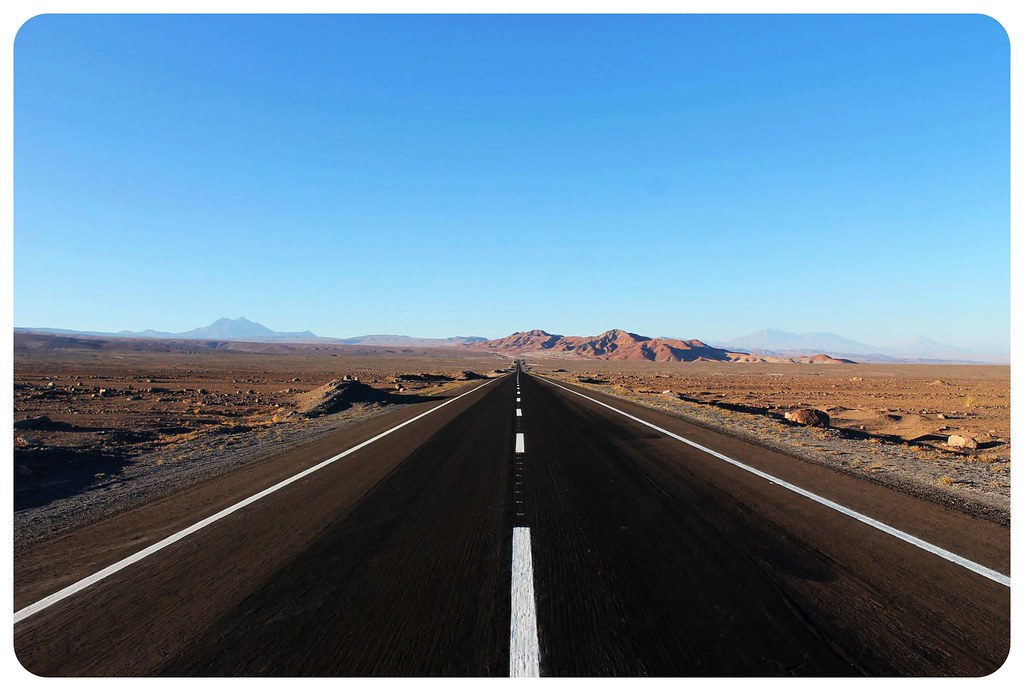 The Atacama Desert is a 600-mile-long (1,000 kilometers) plateau in northern Chile, close to the borders of Bolivia and Argentina, barely populated, and the driest desert on the planet. It is also among the barest and bleakest sceneries we have ever seen.
The Atacama Desert is a 600-mile-long (1,000 kilometers) plateau in northern Chile, close to the borders of Bolivia and Argentina, barely populated, and the driest desert on the planet. It is also among the barest and bleakest sceneries we have ever seen.
 Looking at this harsh, yet captivating landscape, I can easily picture the surface of Mars looking exactly like this. The only word that comes to mind to describe this scene is ‘otherworldly’.
Looking at this harsh, yet captivating landscape, I can easily picture the surface of Mars looking exactly like this. The only word that comes to mind to describe this scene is ‘otherworldly’.
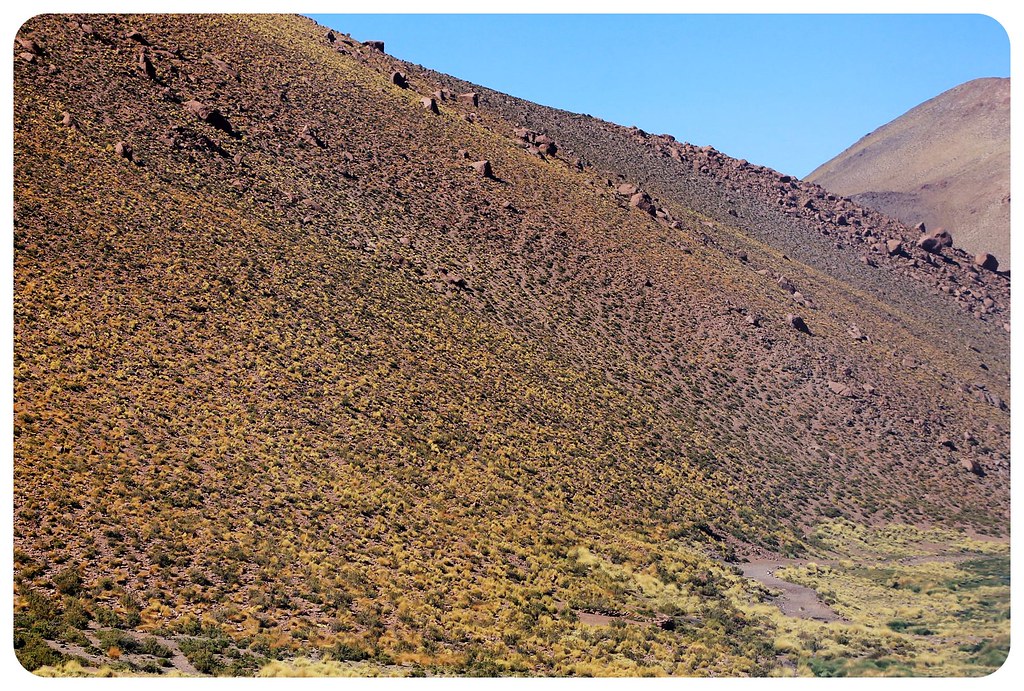
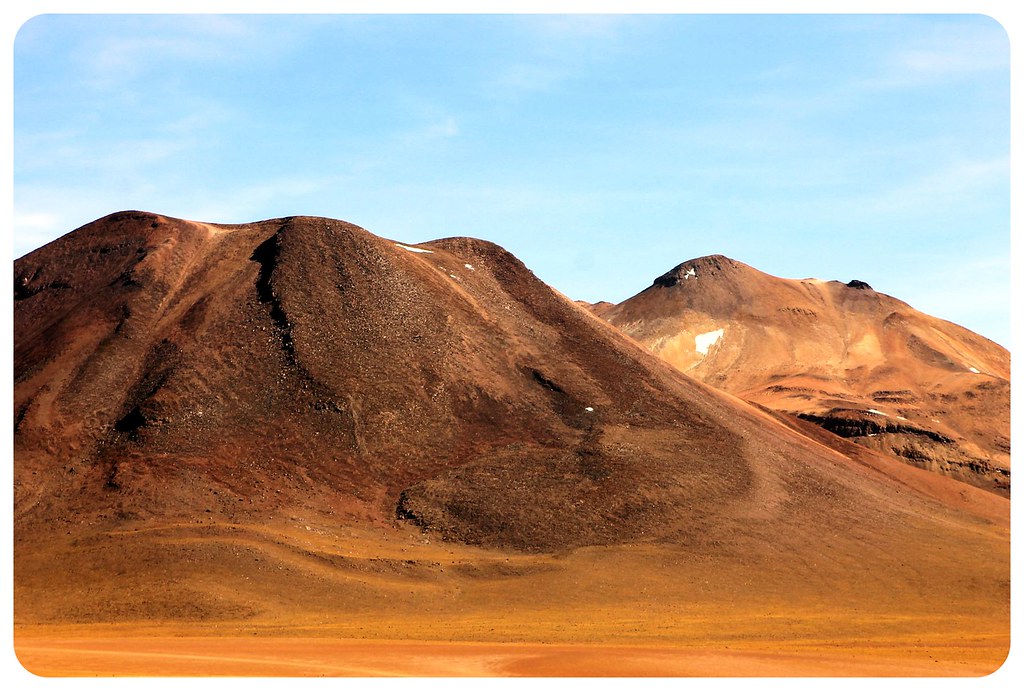 At times, dry shrubs and bushes cover the ground, but most of the time there is nothing but rocks and gravel.
At times, dry shrubs and bushes cover the ground, but most of the time there is nothing but rocks and gravel.
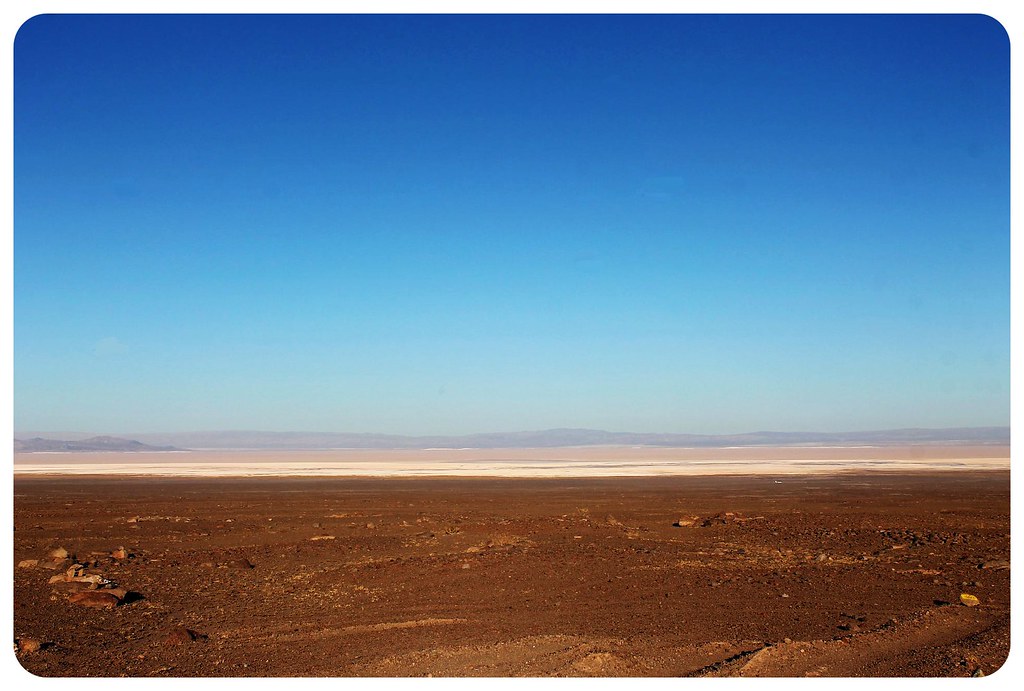 As the bus descended down that consistently straight, steep road, we couldn’t help but wonder where San Pedro could possibly be. There are no signs of civilization for miles and miles – just the lunar landscapes of the Atacama Desert in all directions.
As the bus descended down that consistently straight, steep road, we couldn’t help but wonder where San Pedro could possibly be. There are no signs of civilization for miles and miles – just the lunar landscapes of the Atacama Desert in all directions.
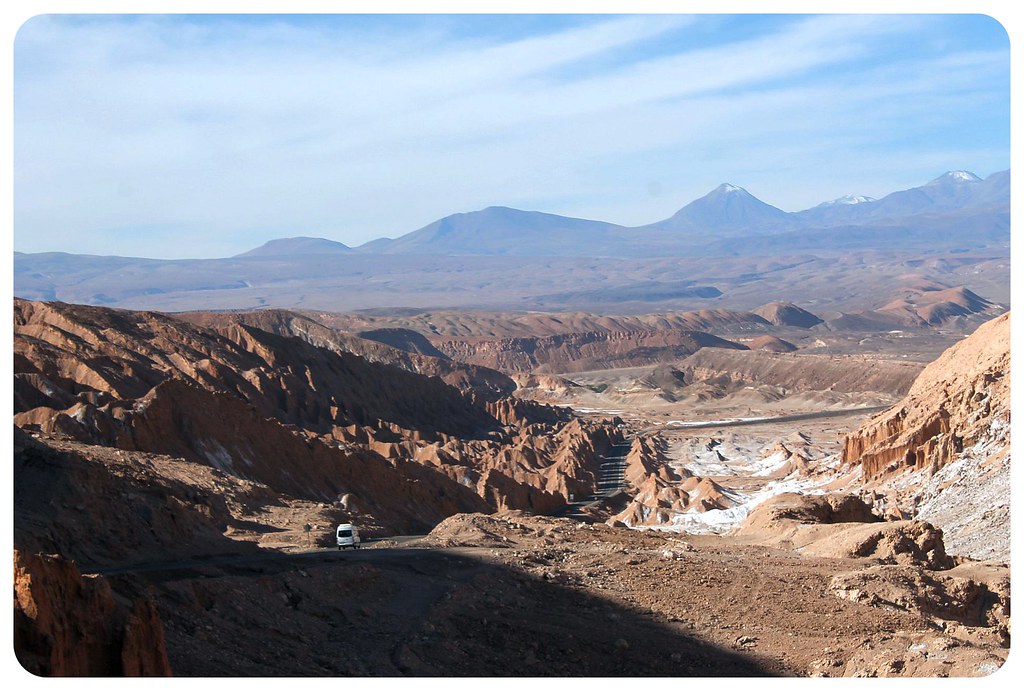 When we finally reach the village, we are surprised to see that is actually quite green – a lush oasis in the middle of this desolated part of Chile.
When we finally reach the village, we are surprised to see that is actually quite green – a lush oasis in the middle of this desolated part of Chile.
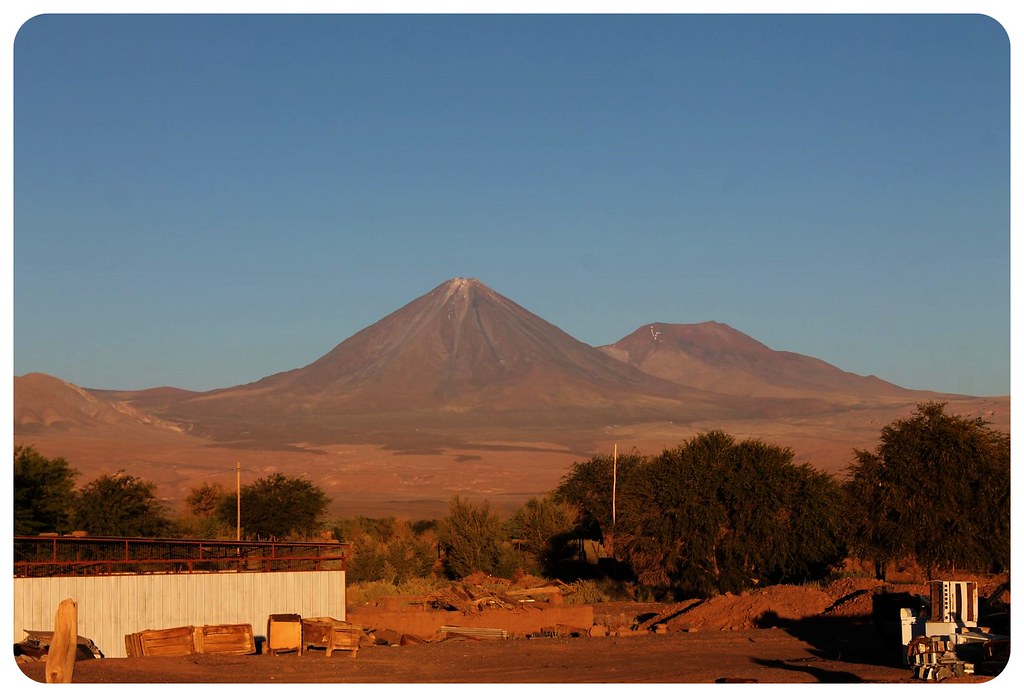 San Pedro de Atacama has doubled its population to 5,000 people over the last decade, becoming more and more popular with travelers from all over the world, but also many Chileans who want to explore this fascinating part of their country.
San Pedro de Atacama has doubled its population to 5,000 people over the last decade, becoming more and more popular with travelers from all over the world, but also many Chileans who want to explore this fascinating part of their country.
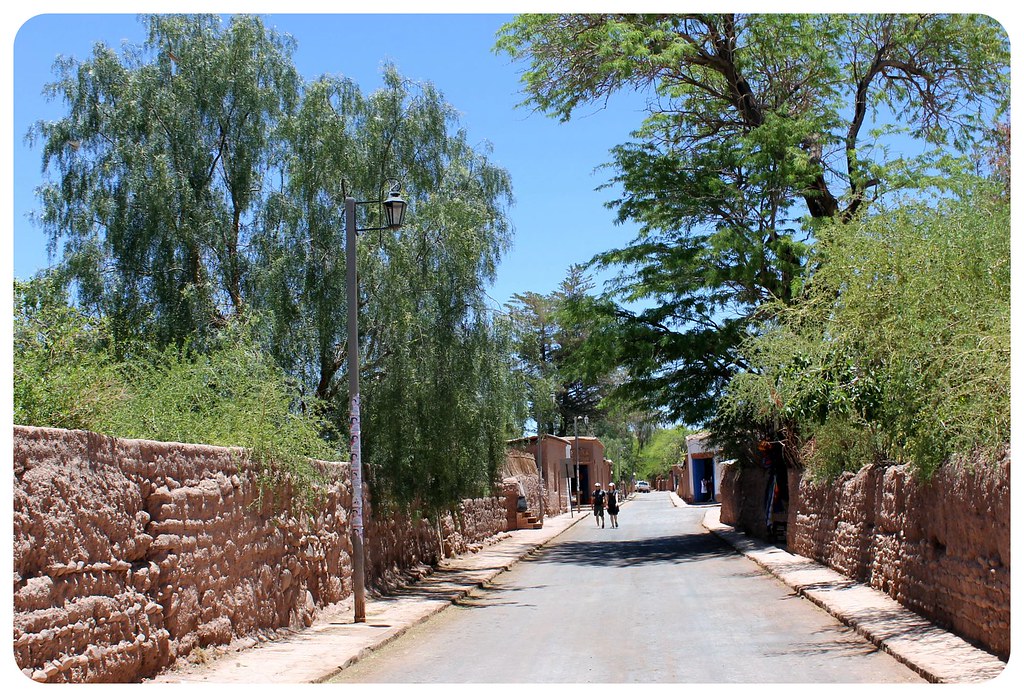 Over the next few days in San Pedro, we explored the desert and discovered that there is much more than barren land here: we see dark blue lagoons, vast salt flats and salt mountains, a moon-like valley, a geyser field and sand dunes.
Over the next few days in San Pedro, we explored the desert and discovered that there is much more than barren land here: we see dark blue lagoons, vast salt flats and salt mountains, a moon-like valley, a geyser field and sand dunes.
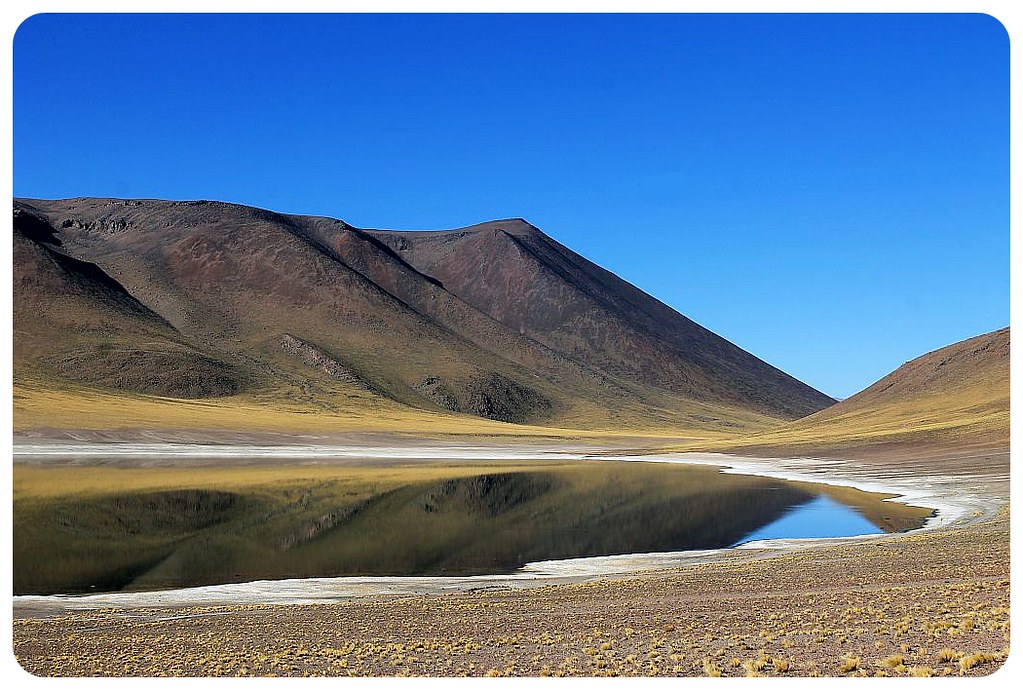
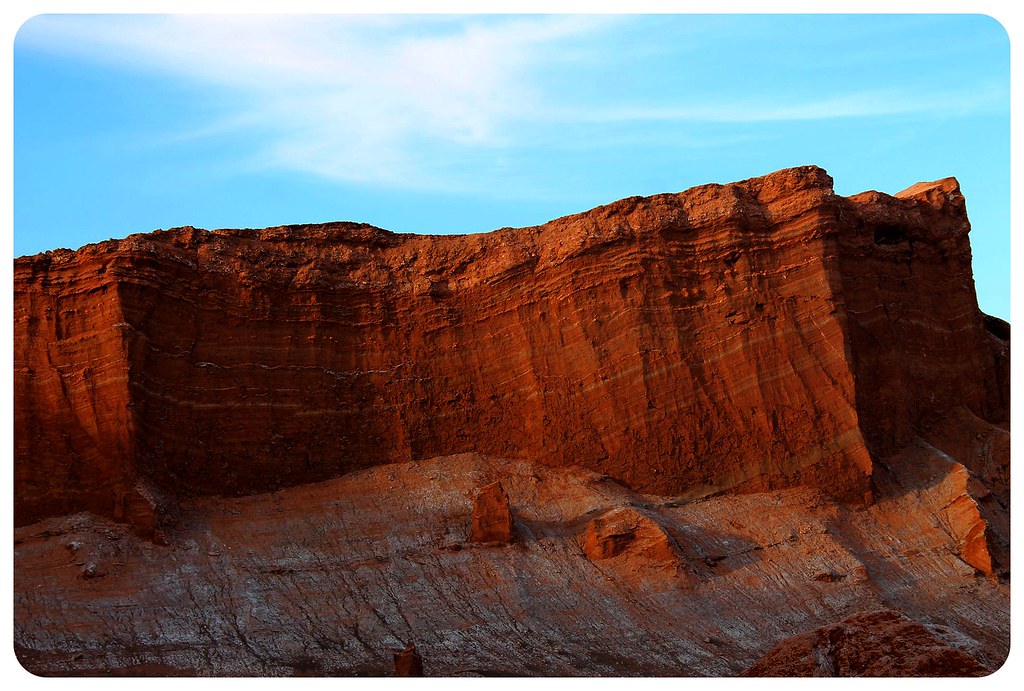 There are smoking volcanoes, canyons and gorges, hot springs and remote desert villages with houses made of volcanic rock – for a desert, there is actually much more diversity than you might expect.
There are smoking volcanoes, canyons and gorges, hot springs and remote desert villages with houses made of volcanic rock – for a desert, there is actually much more diversity than you might expect.
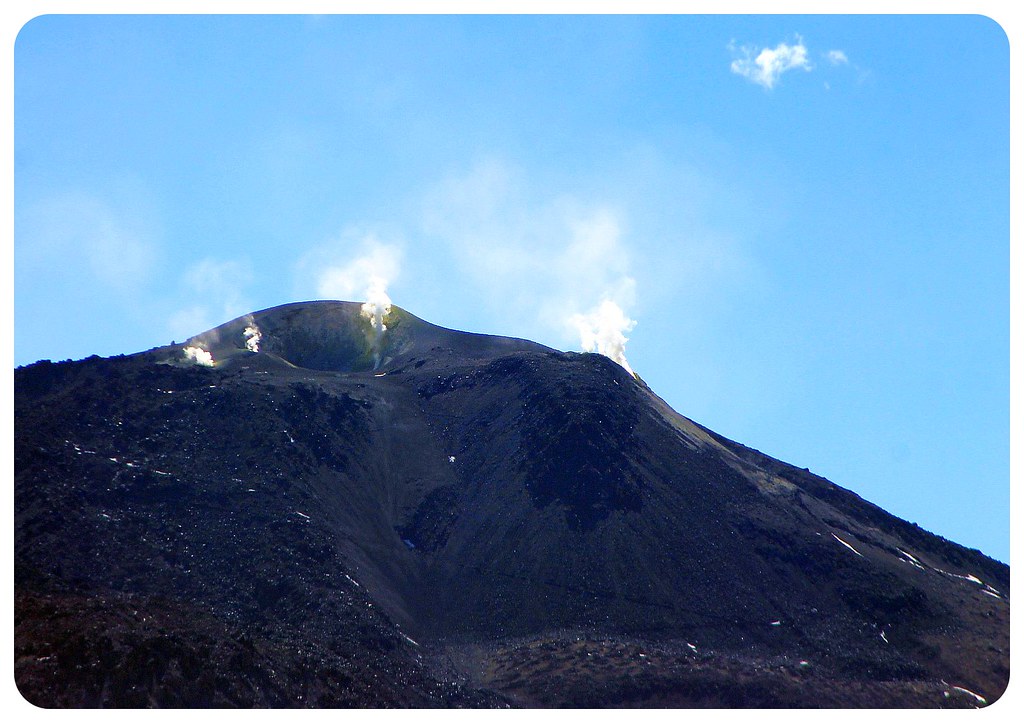
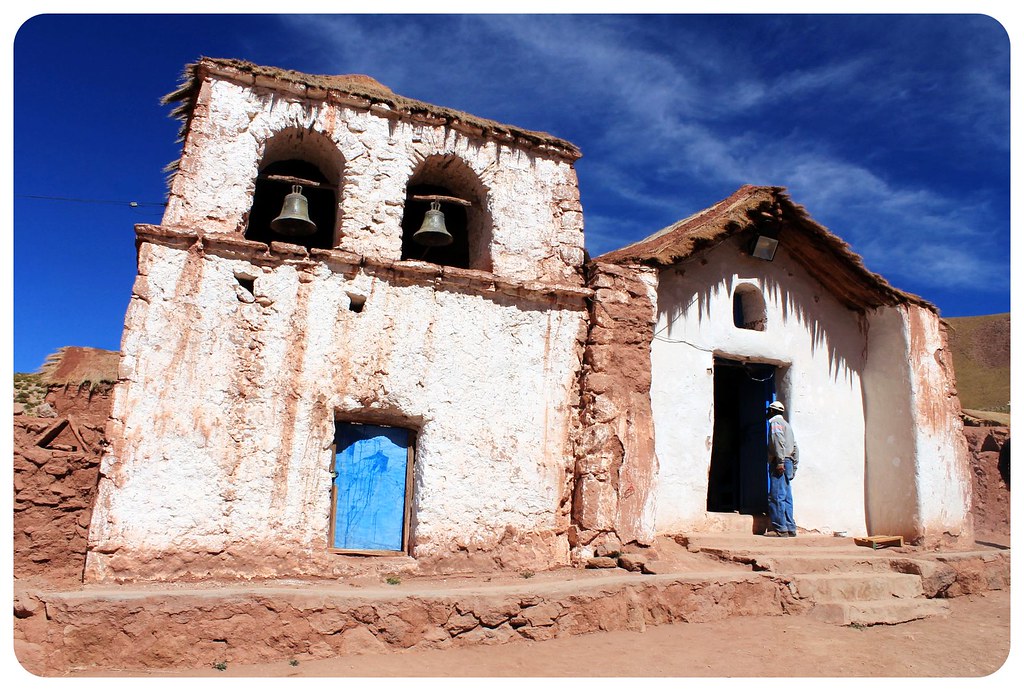 Of course much of the desert does indeed resemble Mars – and not just the looks but the conditions as well. Water is extremely scarce and much of the desert is inhospitable – not even bacteria can survive in some areas!
Of course much of the desert does indeed resemble Mars – and not just the looks but the conditions as well. Water is extremely scarce and much of the desert is inhospitable – not even bacteria can survive in some areas!
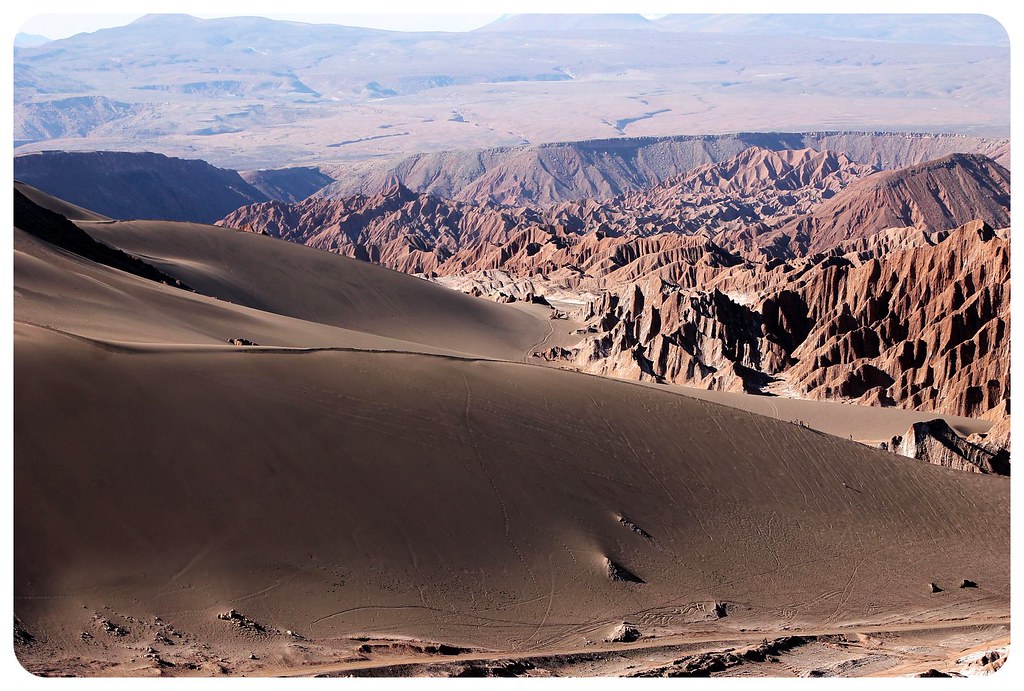 For this reason, NASA actually uses the desert to prepare Mars missions like testing robotic vehicles that will be used on Mars.
For this reason, NASA actually uses the desert to prepare Mars missions like testing robotic vehicles that will be used on Mars.
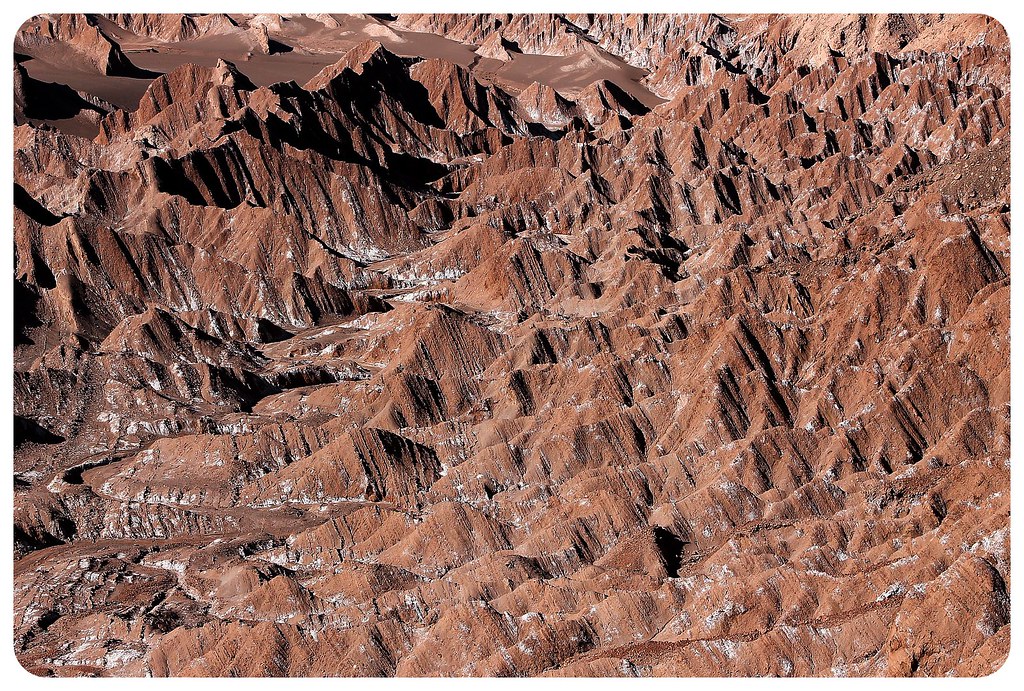 What looks like snow in these pictures, is actually salt. Parts of the Moon Valley (Valle de la Luna) near San Pedro are made up of dry lakes, with salt covering the surface.
What looks like snow in these pictures, is actually salt. Parts of the Moon Valley (Valle de la Luna) near San Pedro are made up of dry lakes, with salt covering the surface.
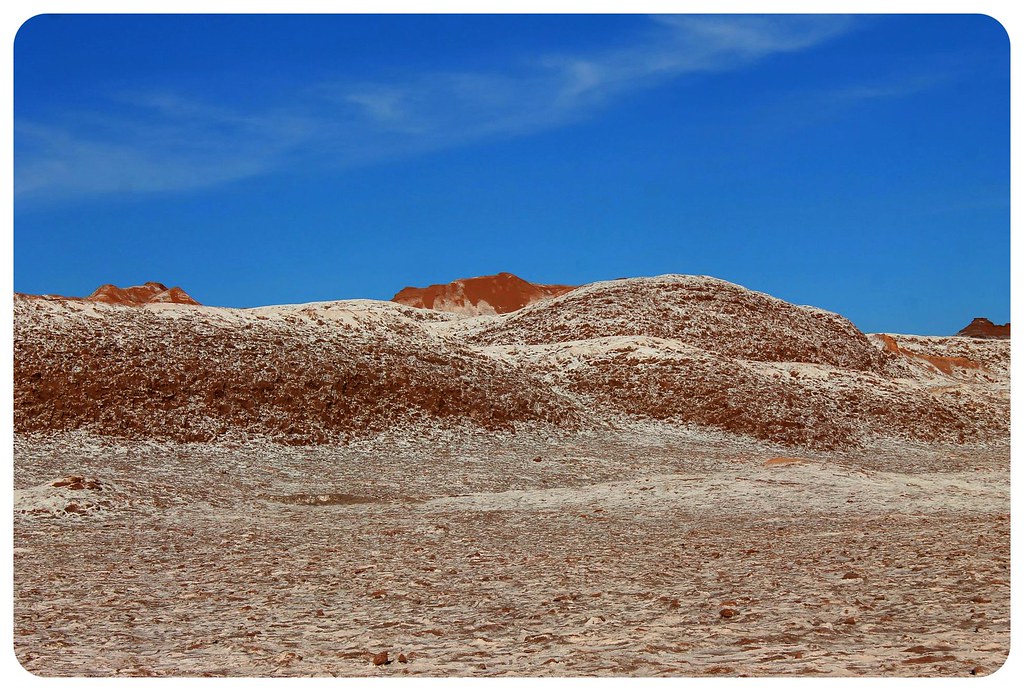
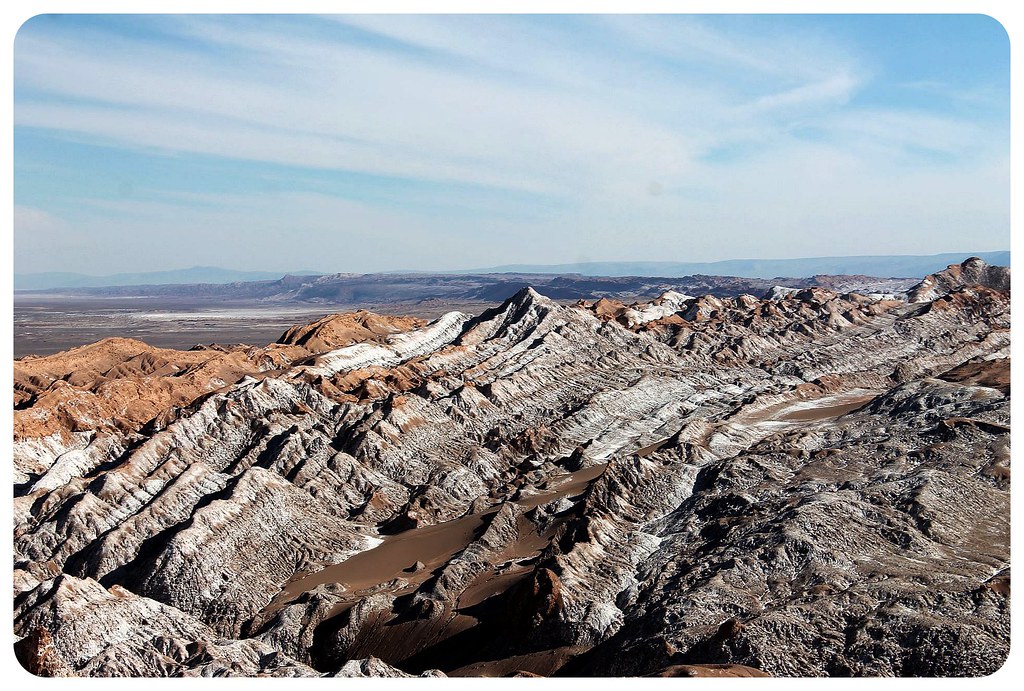 Several saline outcrops have been carved into naturally sculptured statues by wind and time.
Several saline outcrops have been carved into naturally sculptured statues by wind and time.
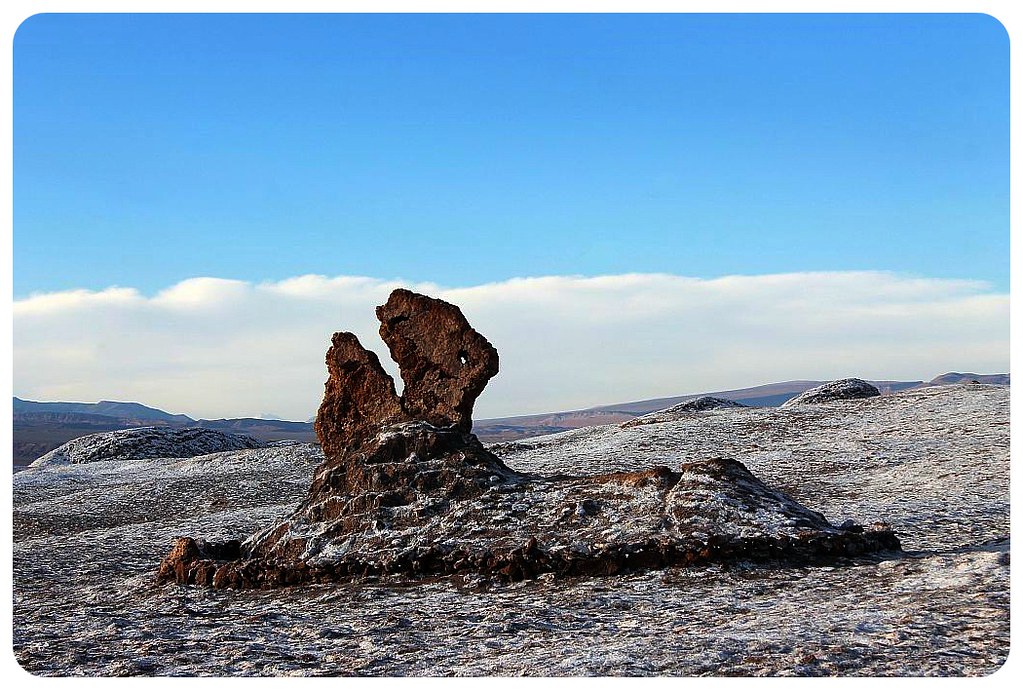 The Three Marias, one of the most recognized salt structures of the Atacama, is made of clay, salt, gems, gravel and quartz and is approximately one million years old.
The Three Marias, one of the most recognized salt structures of the Atacama, is made of clay, salt, gems, gravel and quartz and is approximately one million years old.
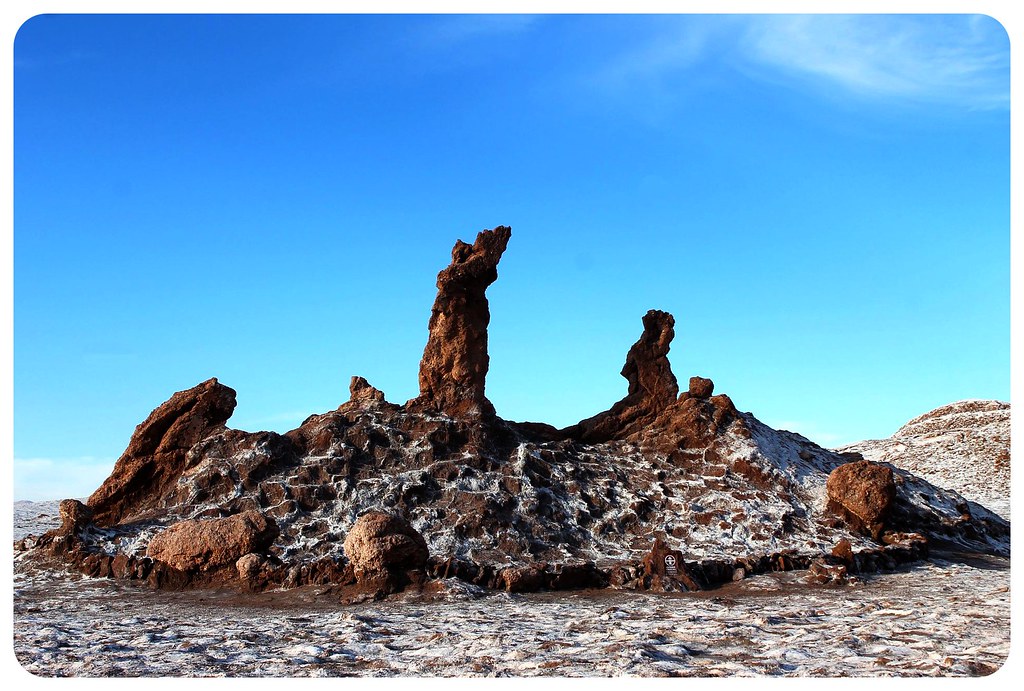 Salt can also be seen on many of the red rocks in the Valle de la Muerte (Death Valley) of the Atacama Desert. Many of the rocks are coated in a white layer of salt originating from volcanic eruptions in the area.
Salt can also be seen on many of the red rocks in the Valle de la Muerte (Death Valley) of the Atacama Desert. Many of the rocks are coated in a white layer of salt originating from volcanic eruptions in the area.
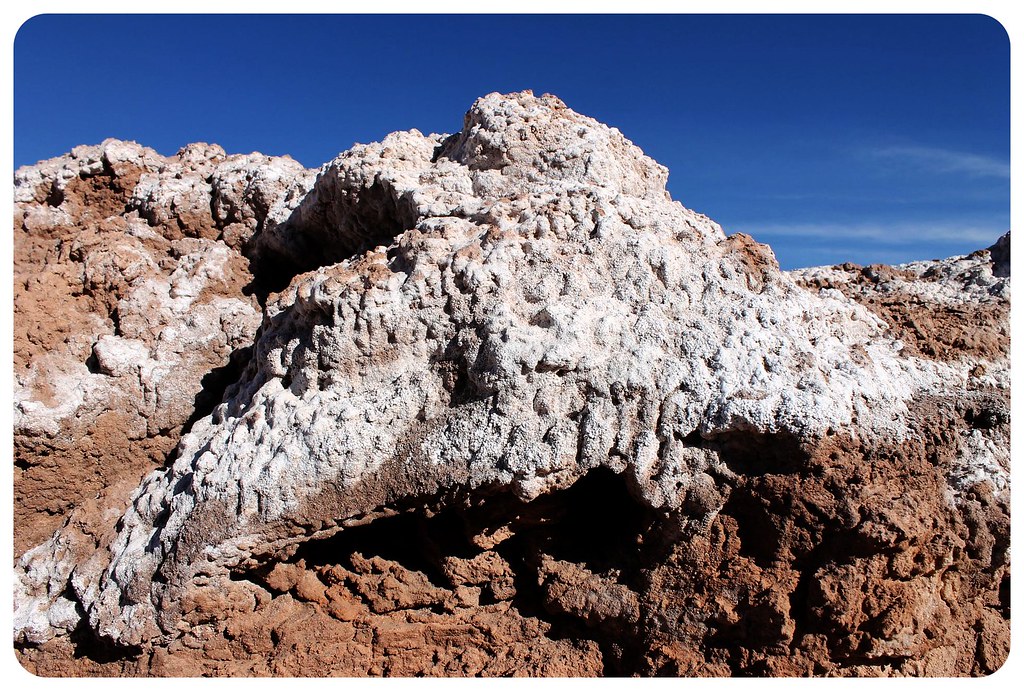
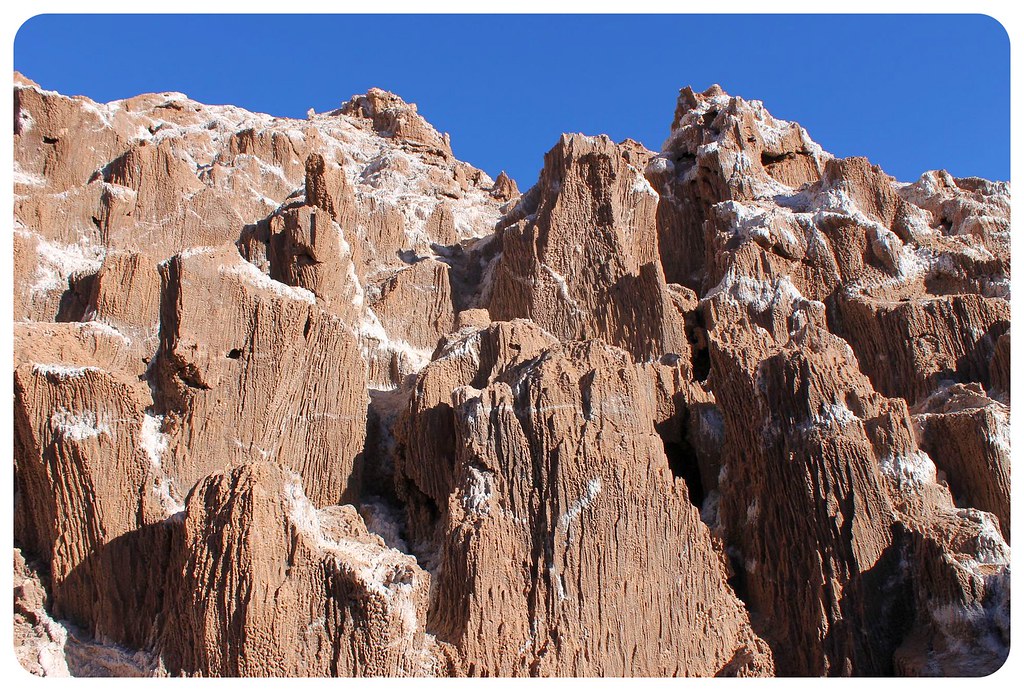 This part of the valley is actually called Cordillera de la Sal (Salt mountain range), and in addition to the salt-covered rocks, we spent time crawling through one of the many salt caves here.
This part of the valley is actually called Cordillera de la Sal (Salt mountain range), and in addition to the salt-covered rocks, we spent time crawling through one of the many salt caves here.
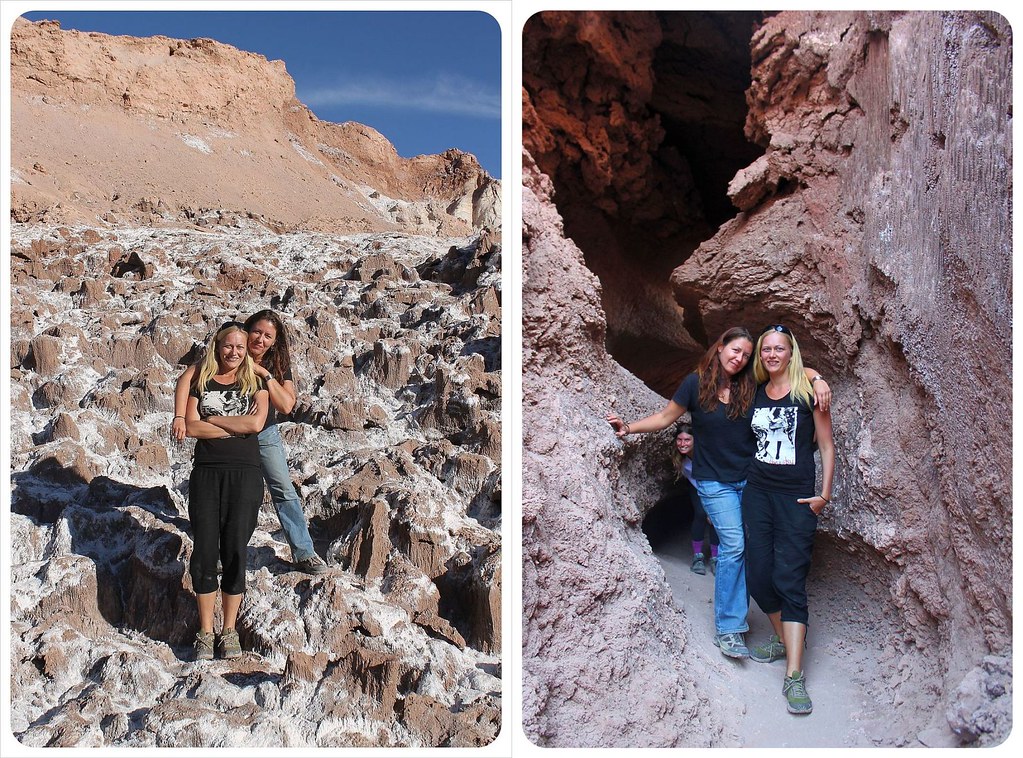
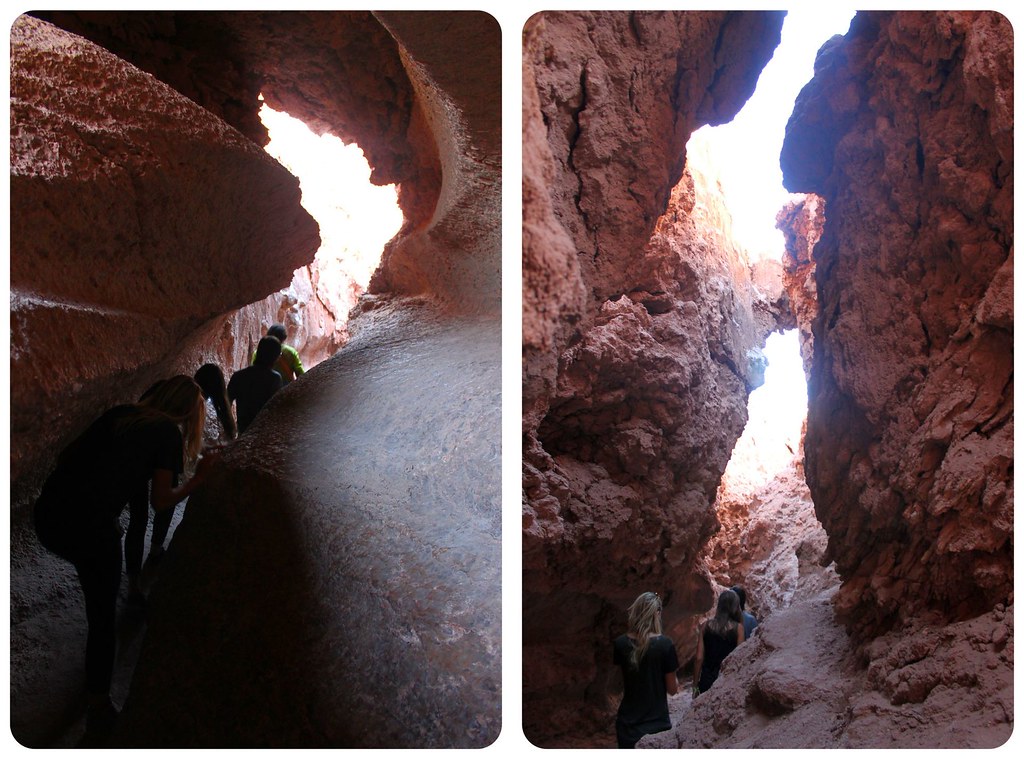 The best time to visit the Death and the Moon Valley is the late afternoon, to see how the lights of the twilight hours change the colors of the mountains and sand dunes.
The best time to visit the Death and the Moon Valley is the late afternoon, to see how the lights of the twilight hours change the colors of the mountains and sand dunes.
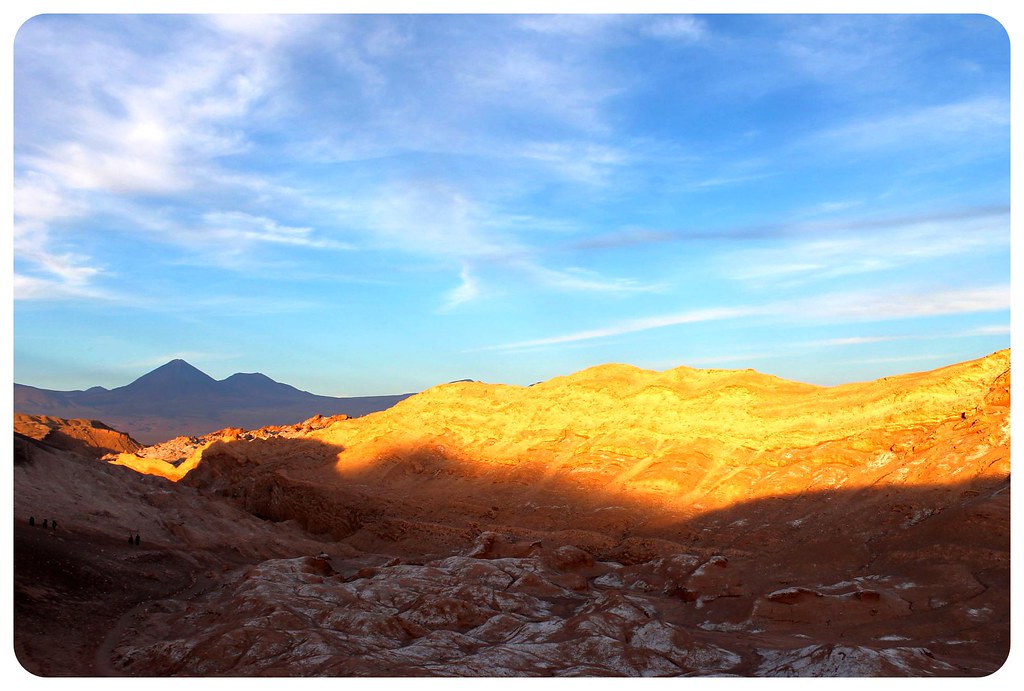
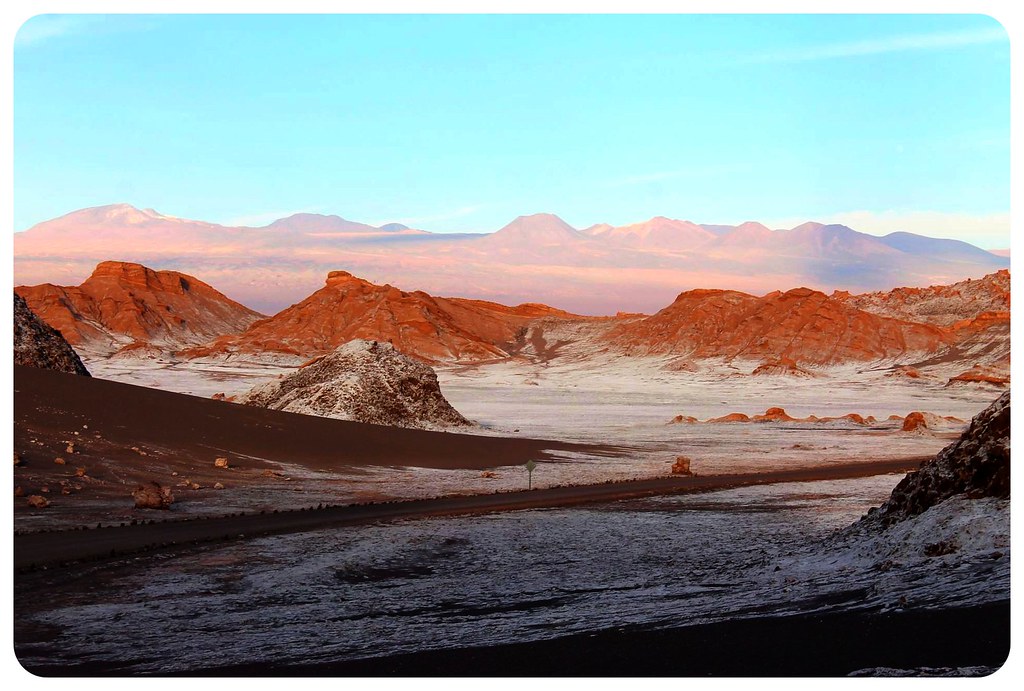
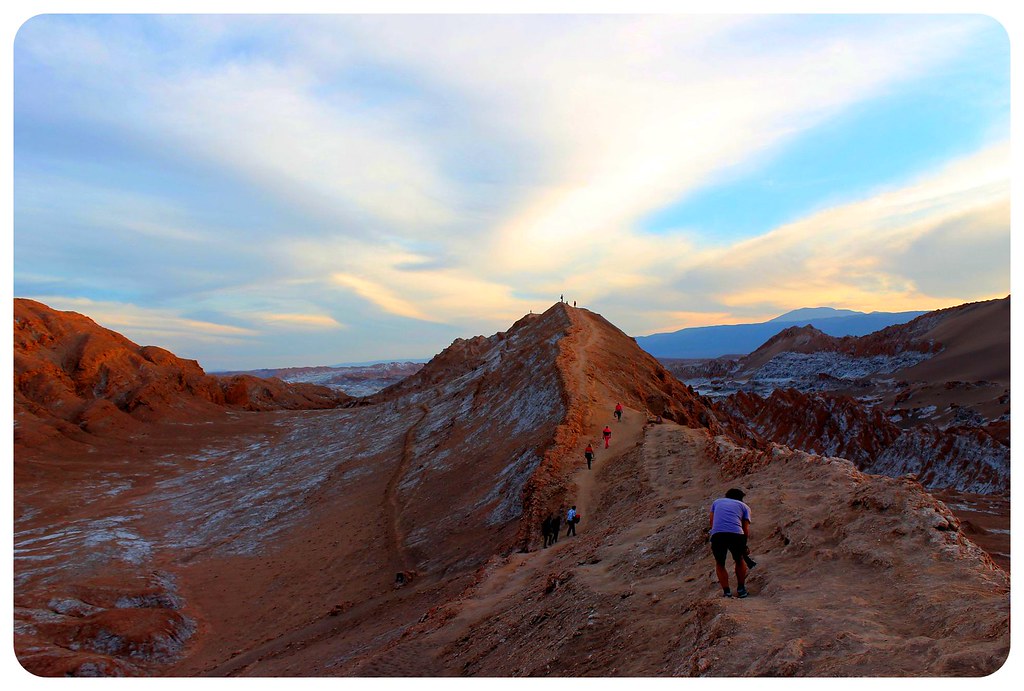 On one all-day tour, it was incredible to watch the landscape change from dry sand to deep volcanic lakes to the shallow waters on top of the salt flats, where hundreds of pink flamingos pecked their way across the water in search of food.
On one all-day tour, it was incredible to watch the landscape change from dry sand to deep volcanic lakes to the shallow waters on top of the salt flats, where hundreds of pink flamingos pecked their way across the water in search of food.
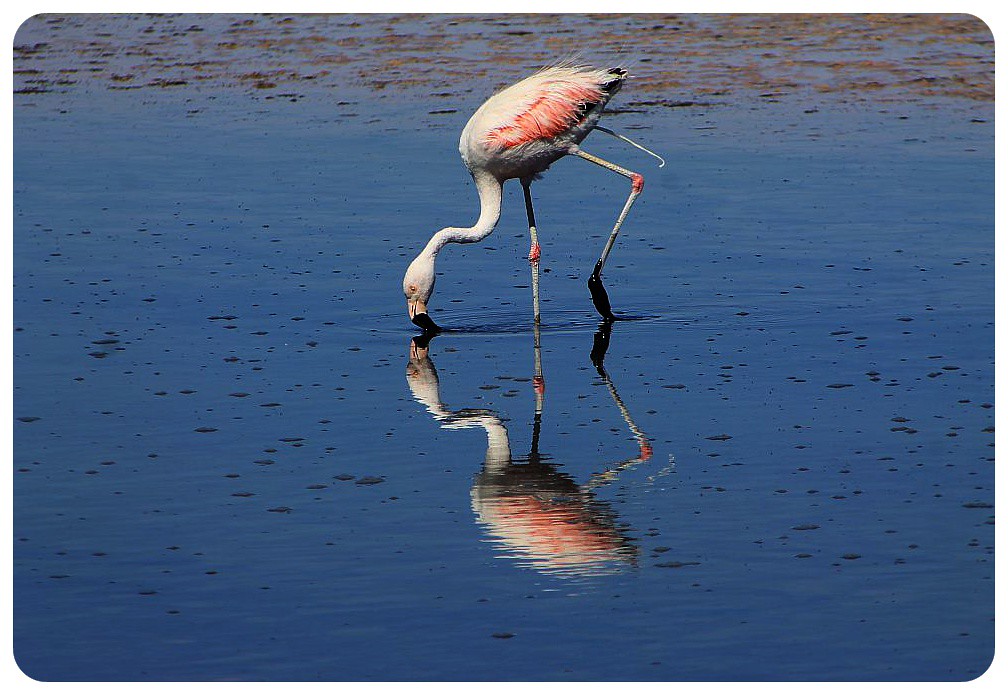 The vast salt flats, the Salar de Atacama, are actually the third largest salt flats in the world, after the nearby Salar de Uyuni in Bolivia and the Salinas Grandes across the Andes in Argentina.
The vast salt flats, the Salar de Atacama, are actually the third largest salt flats in the world, after the nearby Salar de Uyuni in Bolivia and the Salinas Grandes across the Andes in Argentina.
 The Chilean salt flats feel very different to the other two. Here there are more animals, it seems. Like those flamingos…
The Chilean salt flats feel very different to the other two. Here there are more animals, it seems. Like those flamingos…
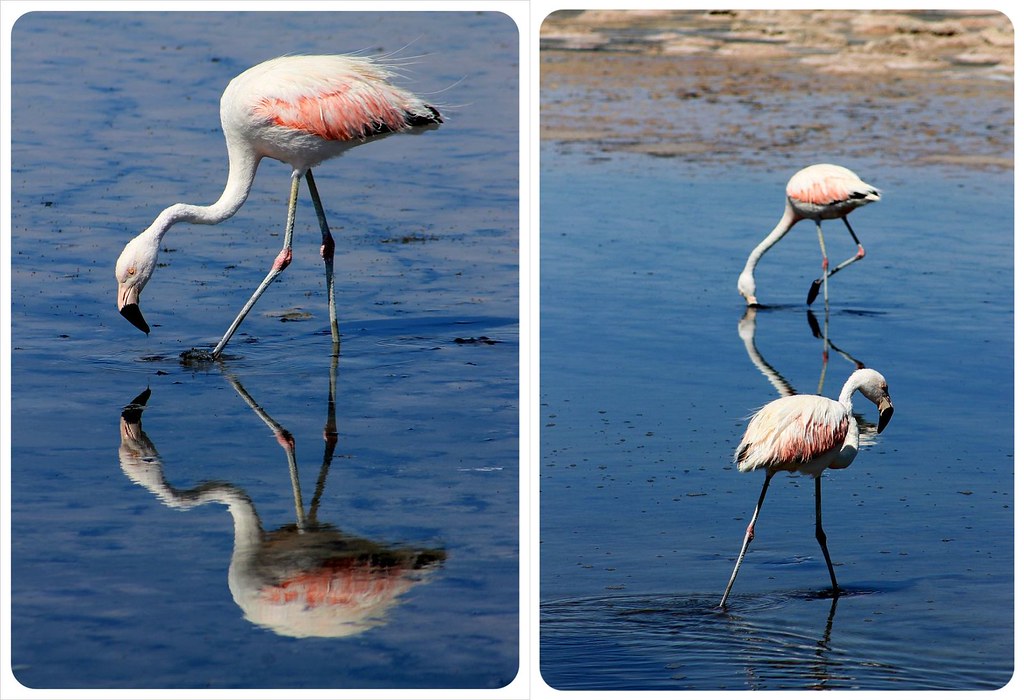 and the lizards…
and the lizards…
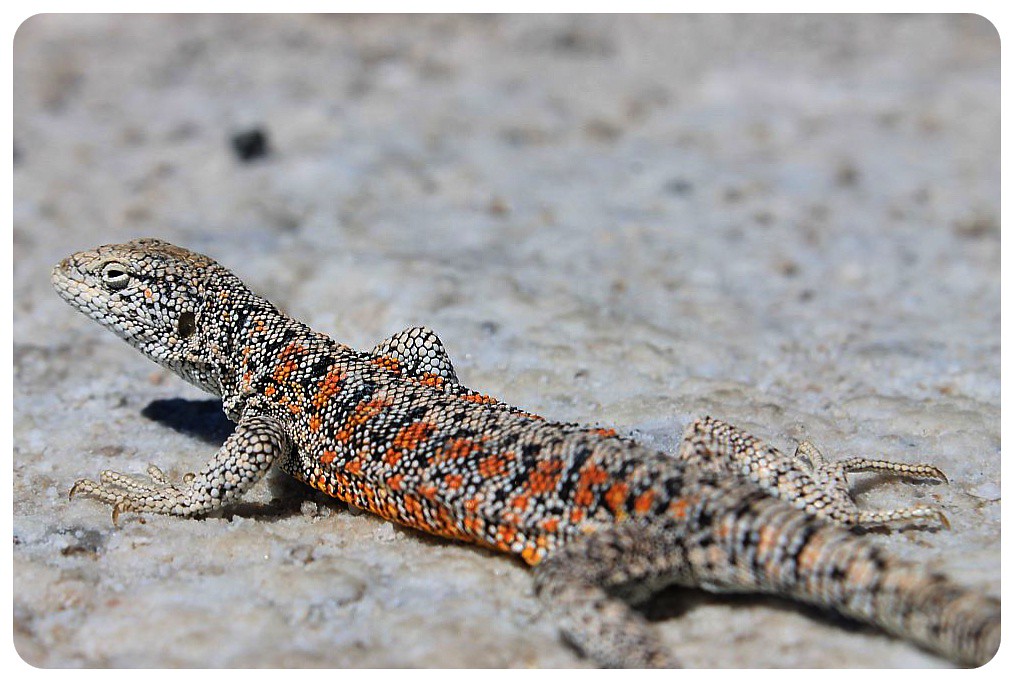 … and also the fact that instead of an almost blinding white salt, the salt flats here are made up of big chunks of grayish salt rocks and boulders sticking up out of the ground.
… and also the fact that instead of an almost blinding white salt, the salt flats here are made up of big chunks of grayish salt rocks and boulders sticking up out of the ground.
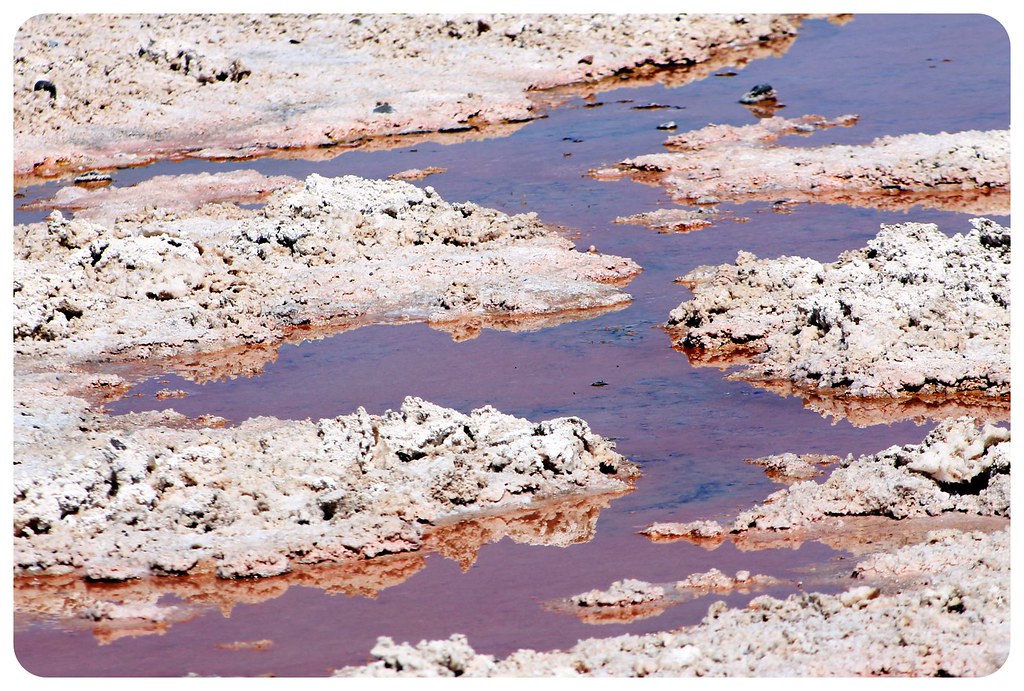
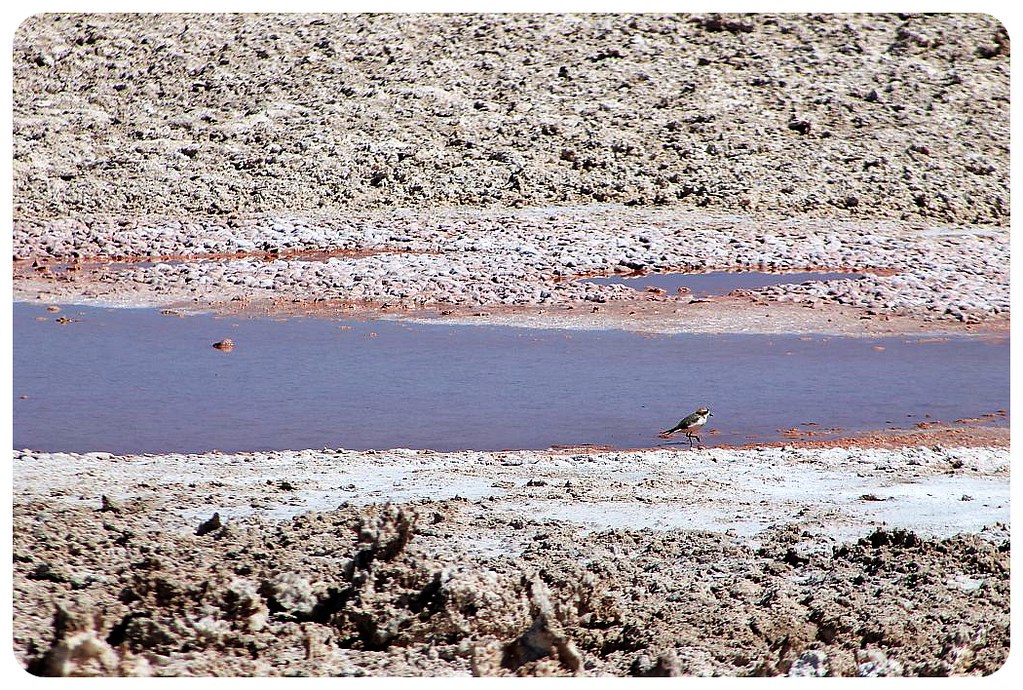 A completely different side of the Atacama Desert are Laguna Miscantes and Miñiques, two altiplano lakes at over 4,200 meters (13,800 feet).
A completely different side of the Atacama Desert are Laguna Miscantes and Miñiques, two altiplano lakes at over 4,200 meters (13,800 feet).
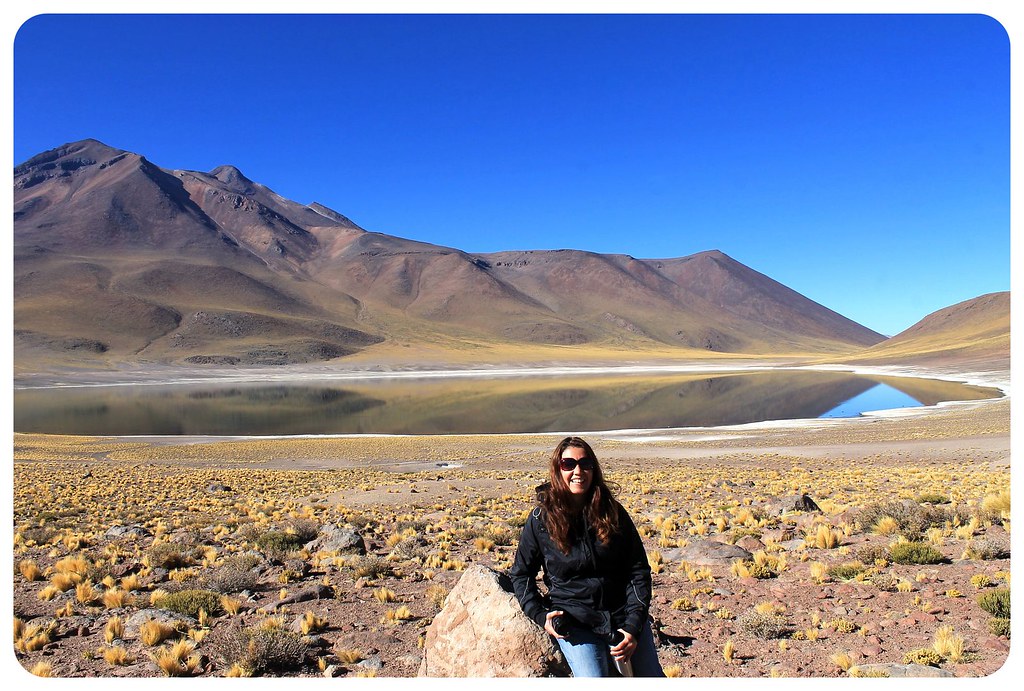 Set next to each other in a spectacular mountain setting, the surrounding yellow grass and brownish mountains create a colorful contrast to the deep blue waters and clear azure skies.
Set next to each other in a spectacular mountain setting, the surrounding yellow grass and brownish mountains create a colorful contrast to the deep blue waters and clear azure skies.
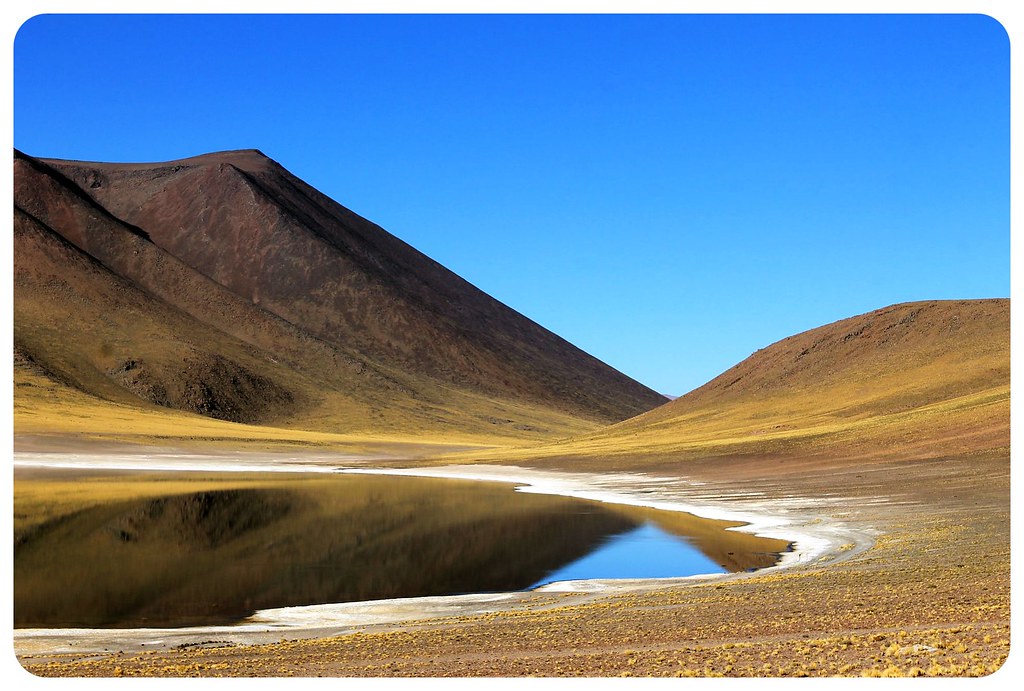 The lake shores are white due to the salt in the soil, adding yet another color.
The lake shores are white due to the salt in the soil, adding yet another color.
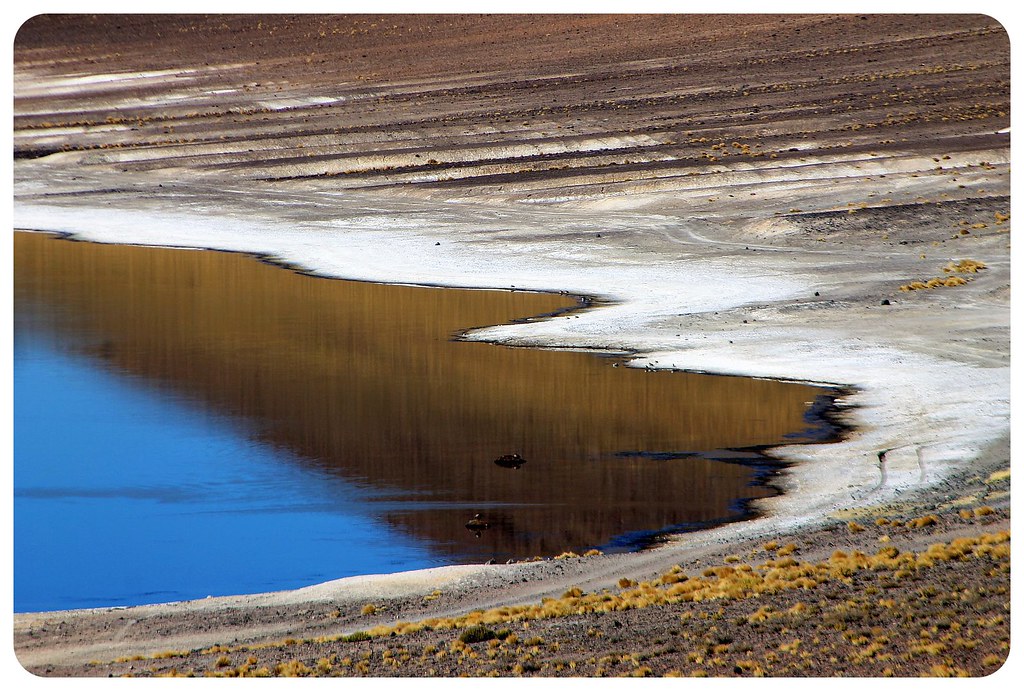 The crystal clear skies are one of the most famous features of the Atacama Desert – on over 300 days of the year there are no clouds whatsoever. This is what makes the desert so desirable for star-gazing as well. And not just by amateurs like us. There are a number of international telescopes in the desert owned (or partially owned) by several countries from around the world.
The crystal clear skies are one of the most famous features of the Atacama Desert – on over 300 days of the year there are no clouds whatsoever. This is what makes the desert so desirable for star-gazing as well. And not just by amateurs like us. There are a number of international telescopes in the desert owned (or partially owned) by several countries from around the world.
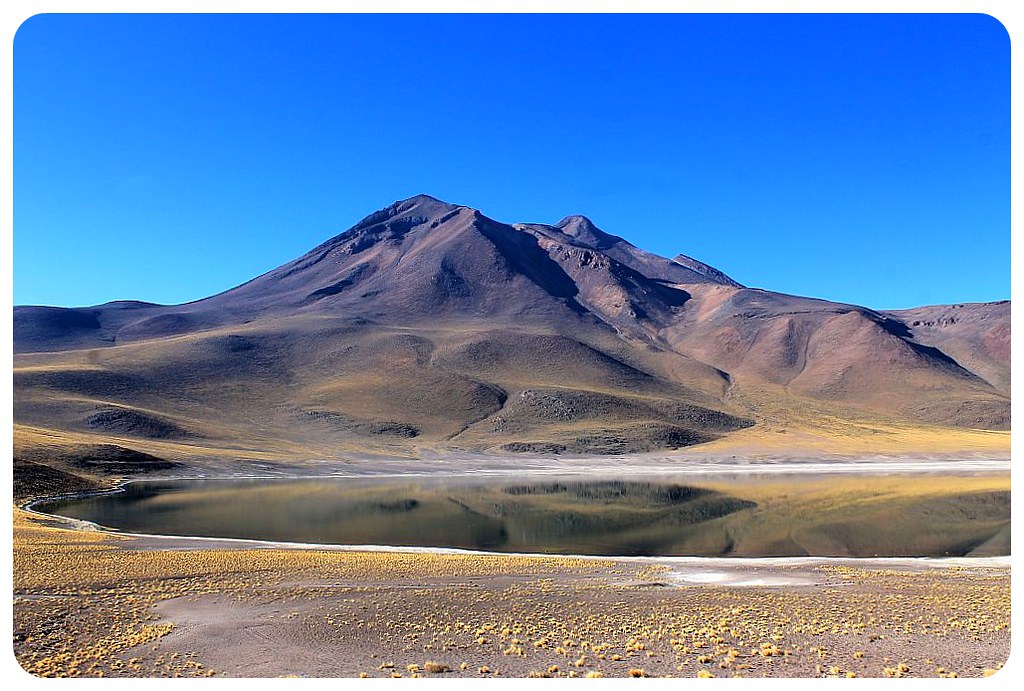 On an early morning trip to the El Tatio Geyser fields, we get to see another completely different face of the desert: steaming hot springs, bubbling and erupting geysers with columns of steam surmounting high into the sky.
On an early morning trip to the El Tatio Geyser fields, we get to see another completely different face of the desert: steaming hot springs, bubbling and erupting geysers with columns of steam surmounting high into the sky.
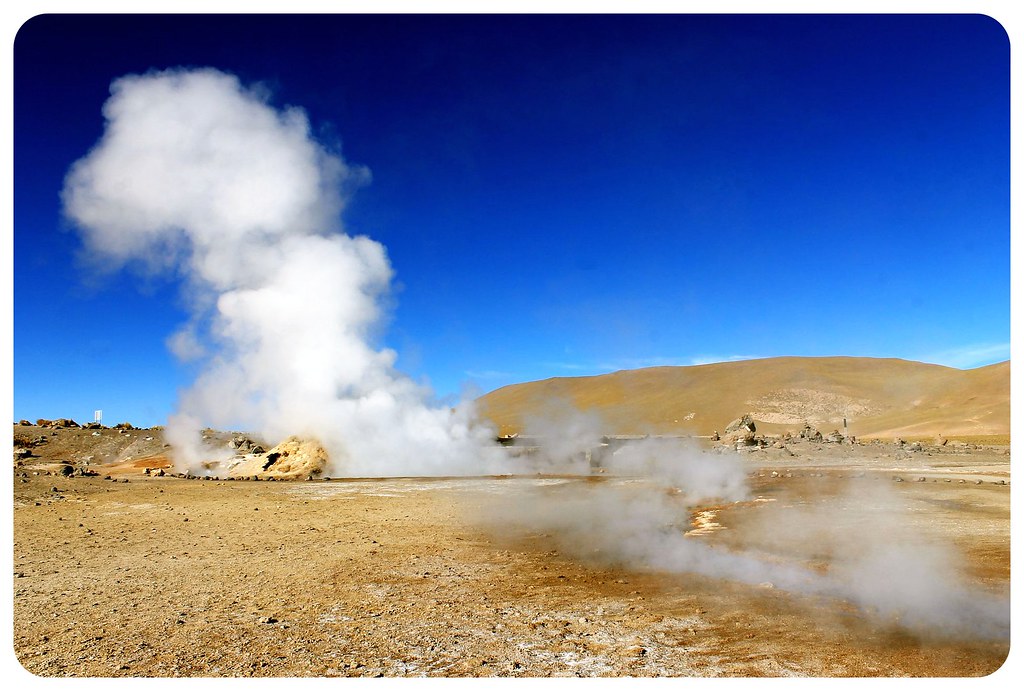 The geyser field is among the highest-elevation geyser fields in the world and consists of around 80 geysers!
The geyser field is among the highest-elevation geyser fields in the world and consists of around 80 geysers!
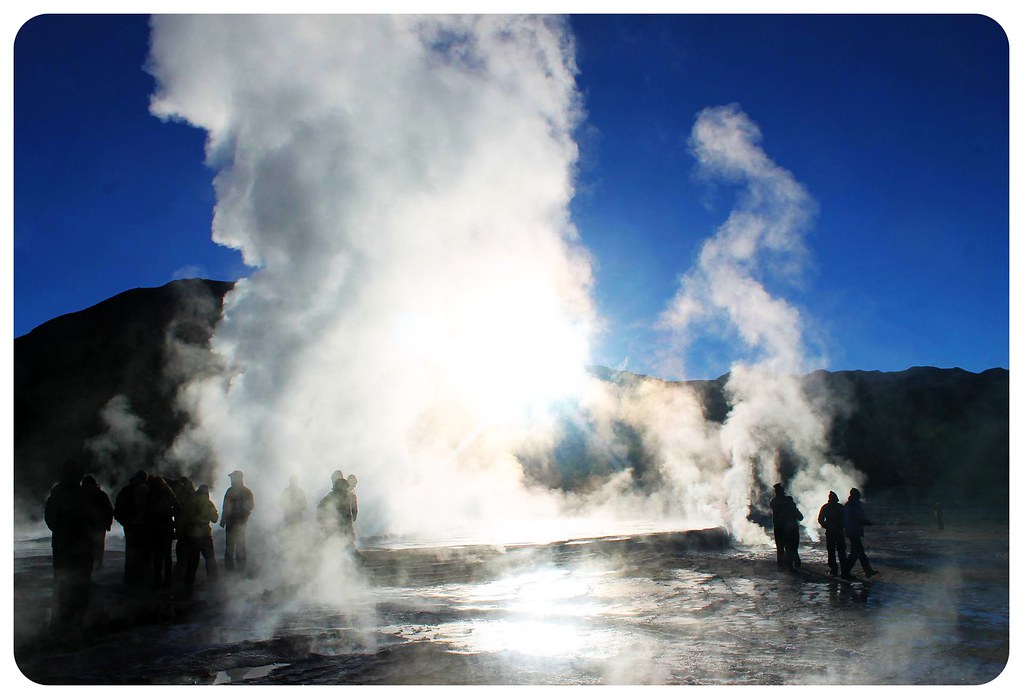
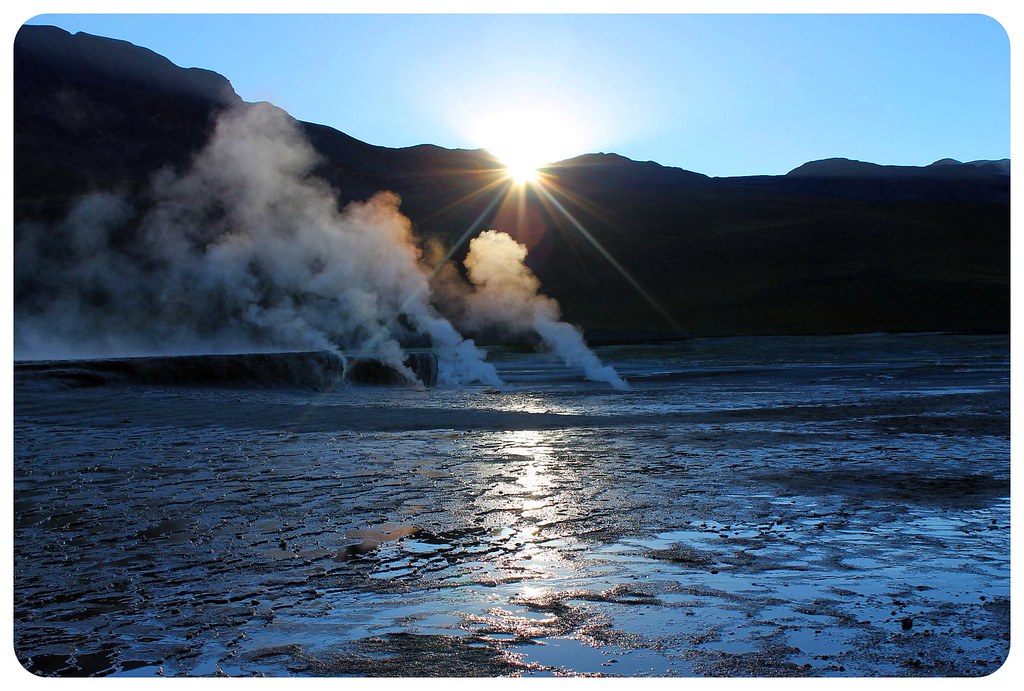 It is the third largest geyser field in the world, and the largest one in the southern hemisphere.
It is the third largest geyser field in the world, and the largest one in the southern hemisphere.
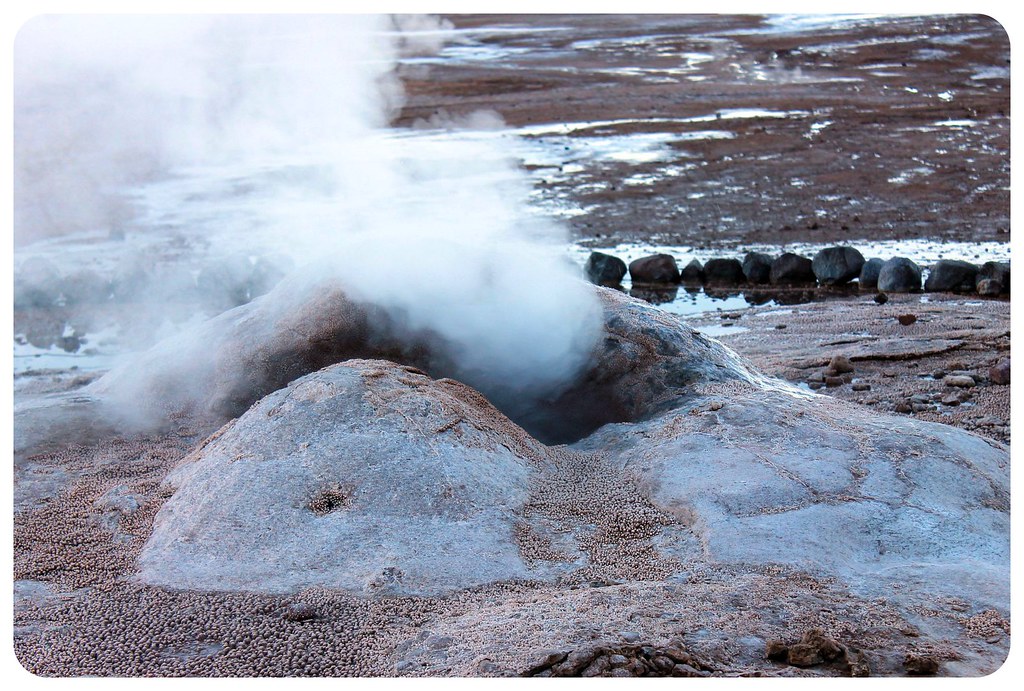 On this particular trip, we had the option to hop into the hot springs which was an inviting thought after feeling like our fingers and toes would freeze off for the two hours before and after sunrise. These hot springs are around 35C (95F), as opposed to the freezing winter air at dawn at 4,320 meters (14,174feet).
On this particular trip, we had the option to hop into the hot springs which was an inviting thought after feeling like our fingers and toes would freeze off for the two hours before and after sunrise. These hot springs are around 35C (95F), as opposed to the freezing winter air at dawn at 4,320 meters (14,174feet).
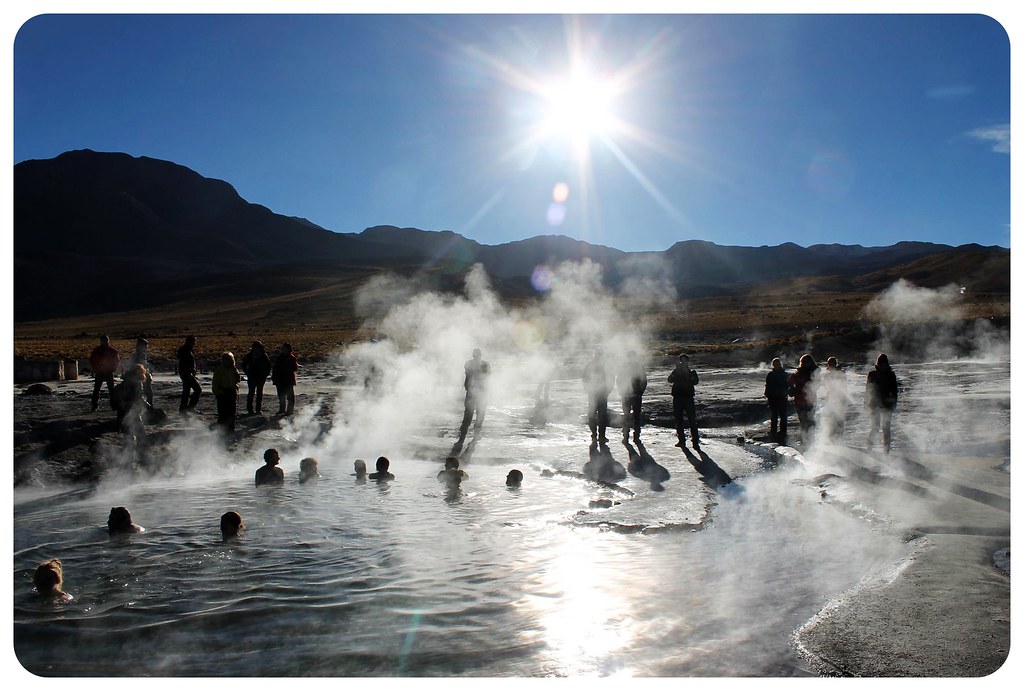 Considering that the Atacama Desert is the driest desert in the world, there are actually quite a few green patches and types of vegetation throughout the entire desert, from scrub brush to green tufts of grass to astonishingly high cacti.
Considering that the Atacama Desert is the driest desert in the world, there are actually quite a few green patches and types of vegetation throughout the entire desert, from scrub brush to green tufts of grass to astonishingly high cacti.
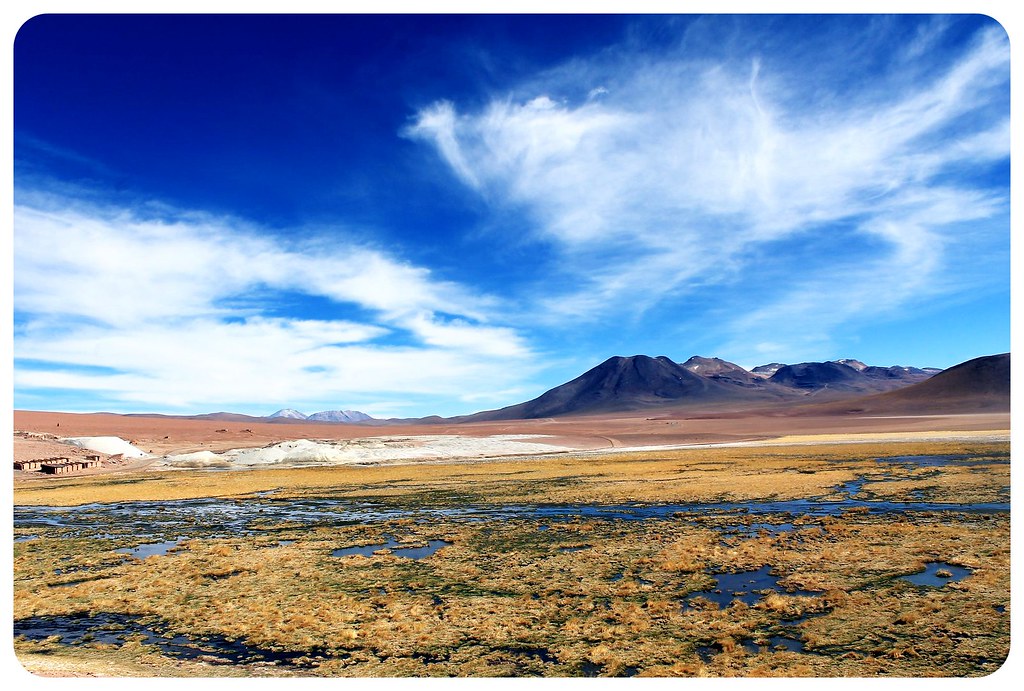 This leads to plenty of wildlife spottings…
This leads to plenty of wildlife spottings…
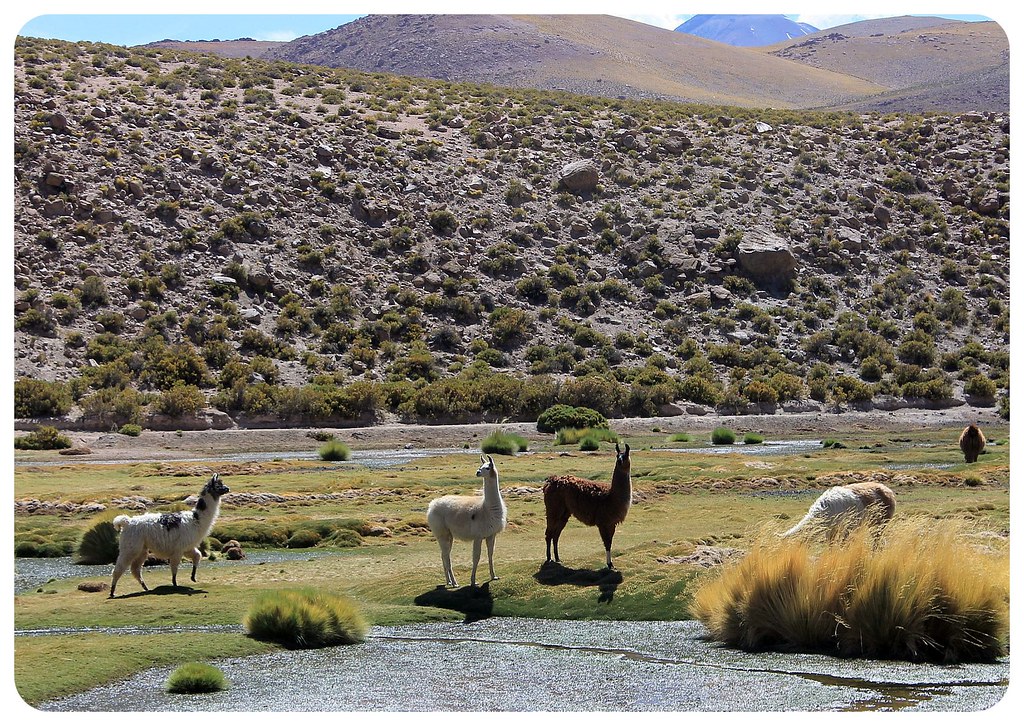 From domesticated llamas to wild vicuñas…
From domesticated llamas to wild vicuñas…
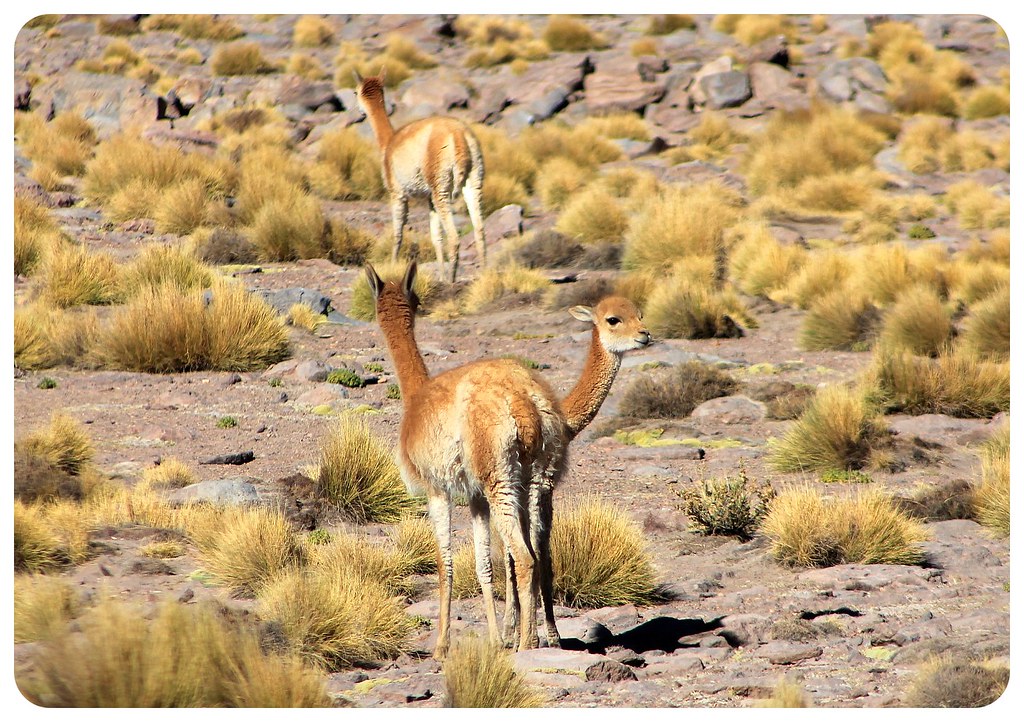 There are lots of viscachas, which are a kind of desert bunny that are related to chinchillas…
There are lots of viscachas, which are a kind of desert bunny that are related to chinchillas…
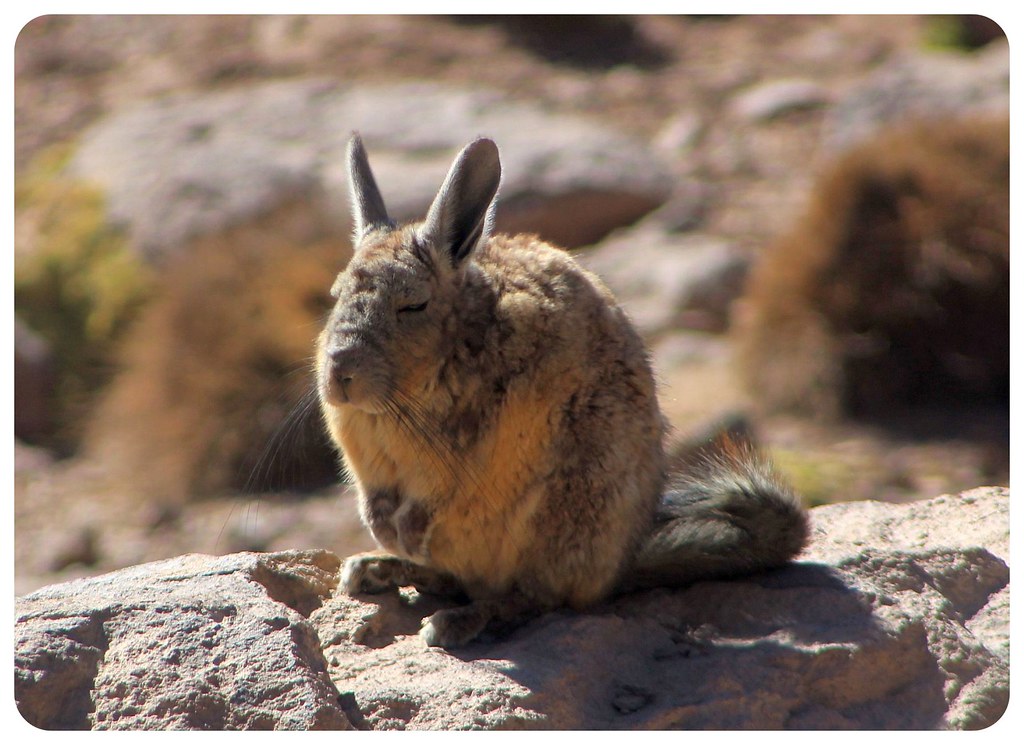 …and desert foxes.
…and desert foxes.
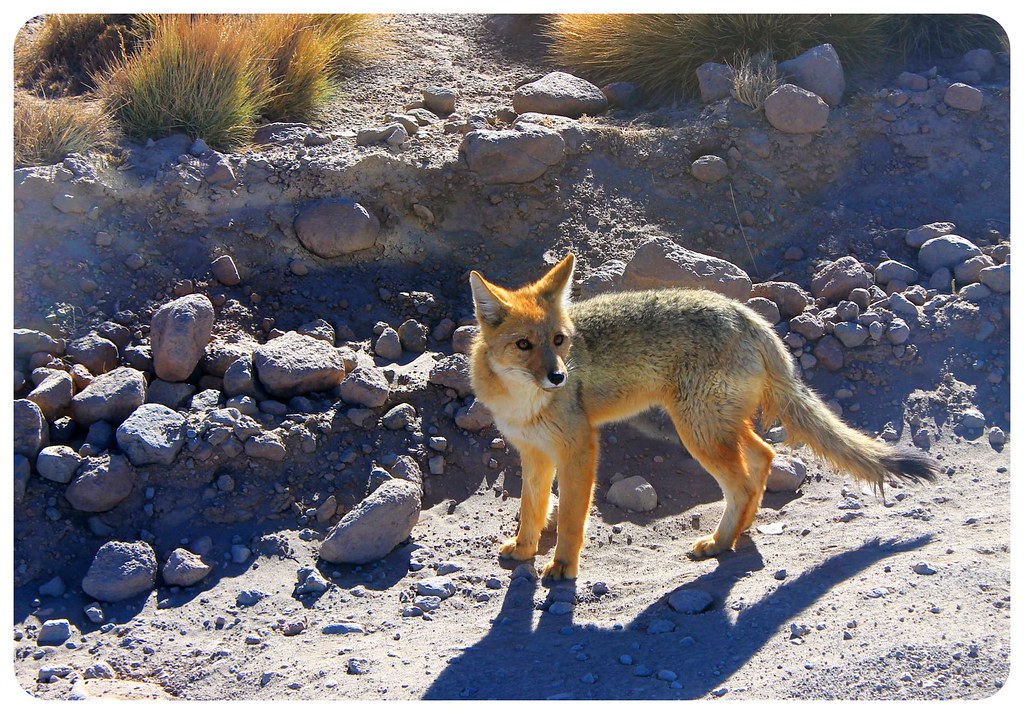 The desert is dry as a bone, making it very hard to survive.
The desert is dry as a bone, making it very hard to survive.
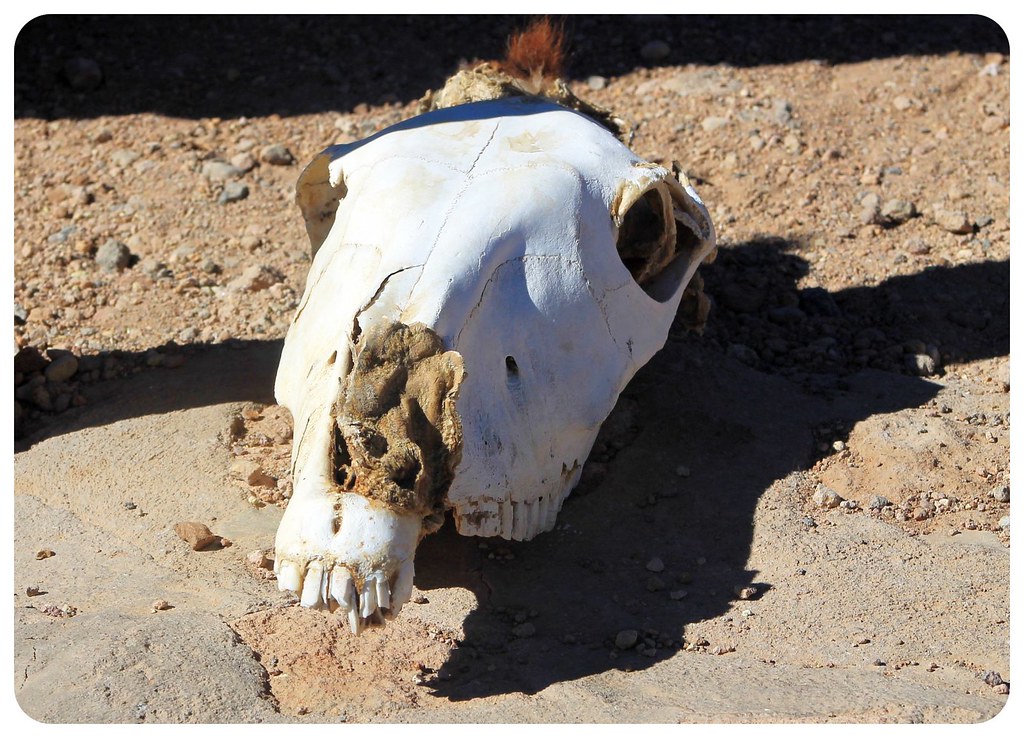 The Atacama Desert is without a doubt one of the most stunning regions we have ever been to, anywhere in the world.
The Atacama Desert is without a doubt one of the most stunning regions we have ever been to, anywhere in the world.
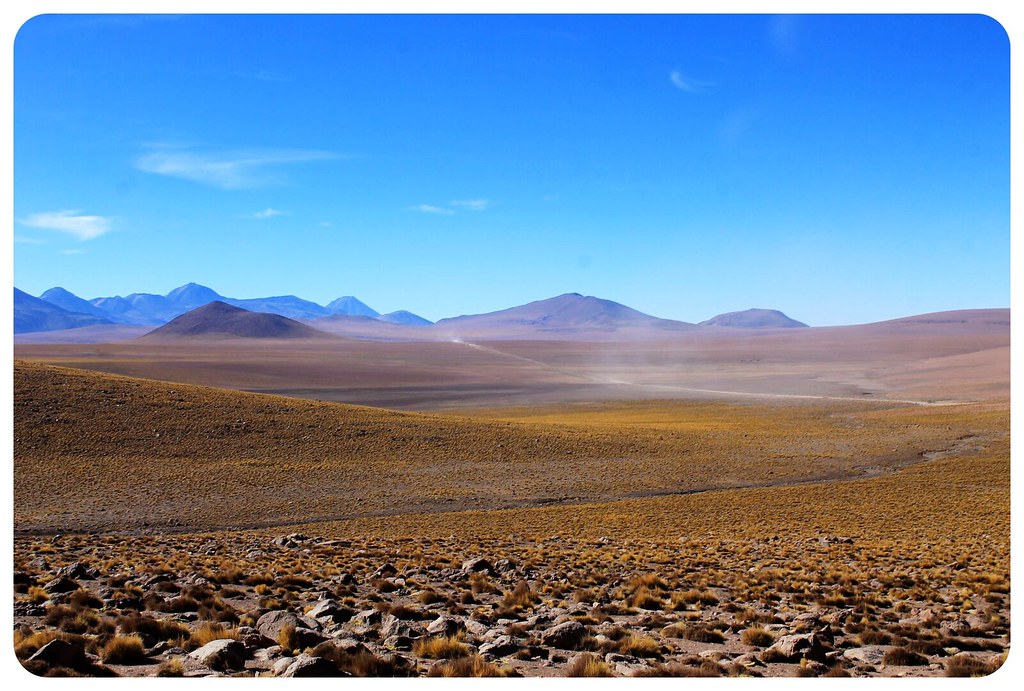 If you are planning a visit to Chile, San Pedro and the Atacama Desert are a must-see stop. From Santiago, this region is a 24-hour bus ride or a short flight into the nearby city of Calama and a 60-mile bus or minibus ride from there.
If you are planning a visit to Chile, San Pedro and the Atacama Desert are a must-see stop. From Santiago, this region is a 24-hour bus ride or a short flight into the nearby city of Calama and a 60-mile bus or minibus ride from there.
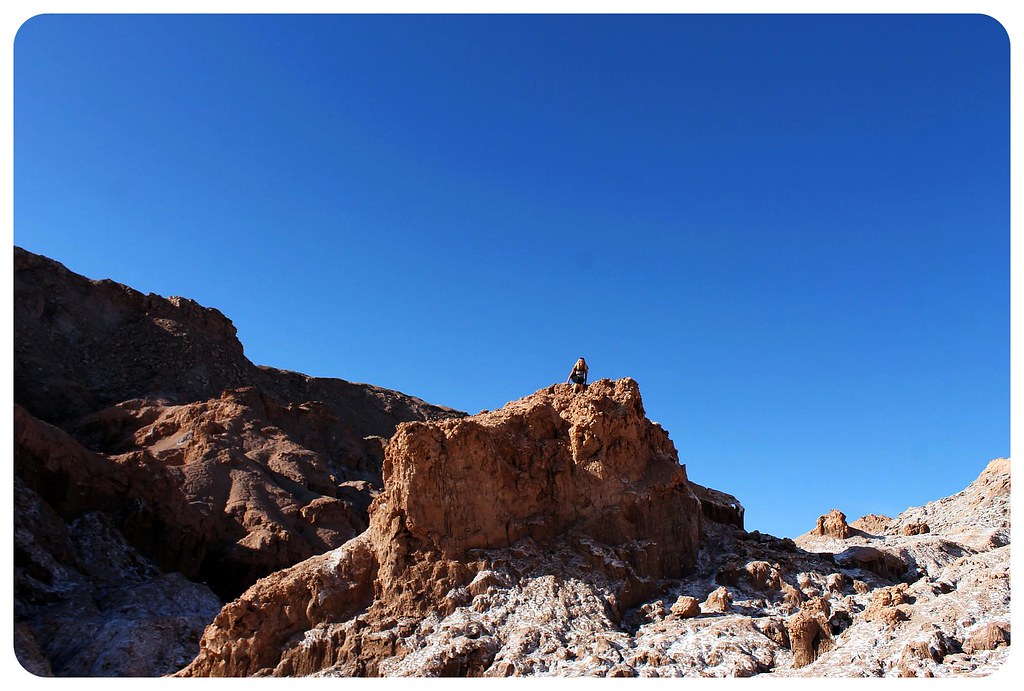
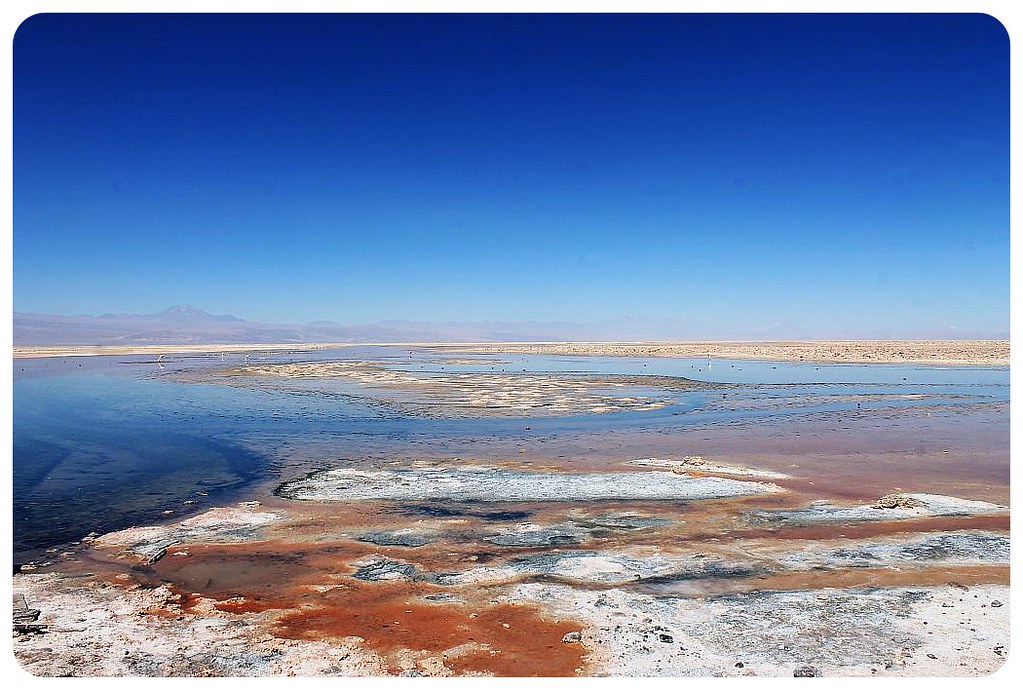
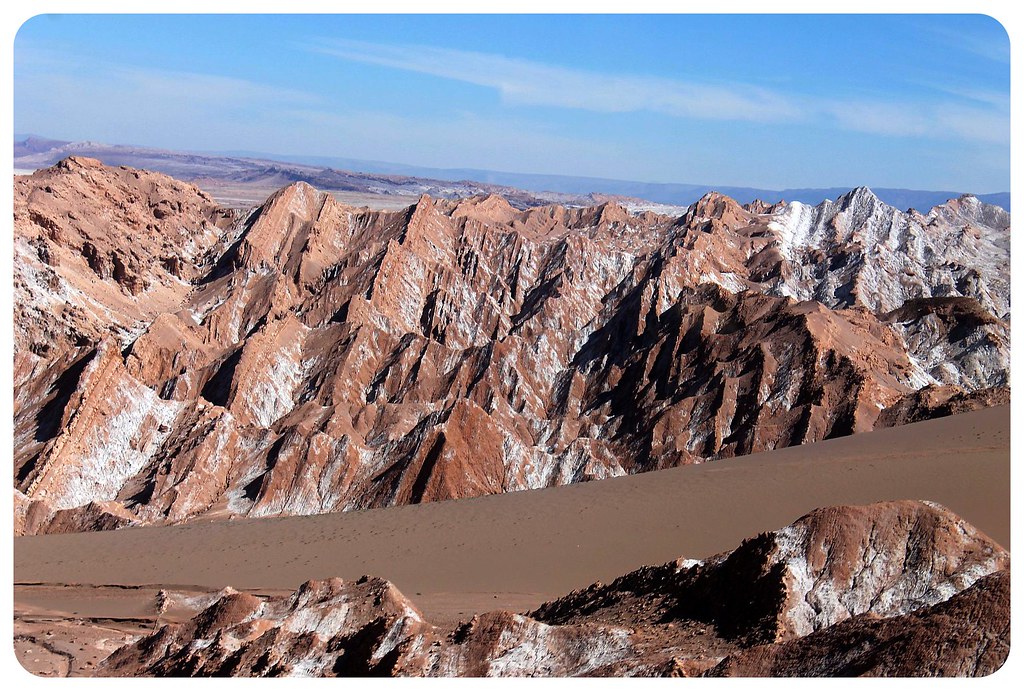 What’s the most extraordinary place you’ve ever been to? Do you want to visit the Atacama Desert? Share in the comments below!
What’s the most extraordinary place you’ve ever been to? Do you want to visit the Atacama Desert? Share in the comments below!

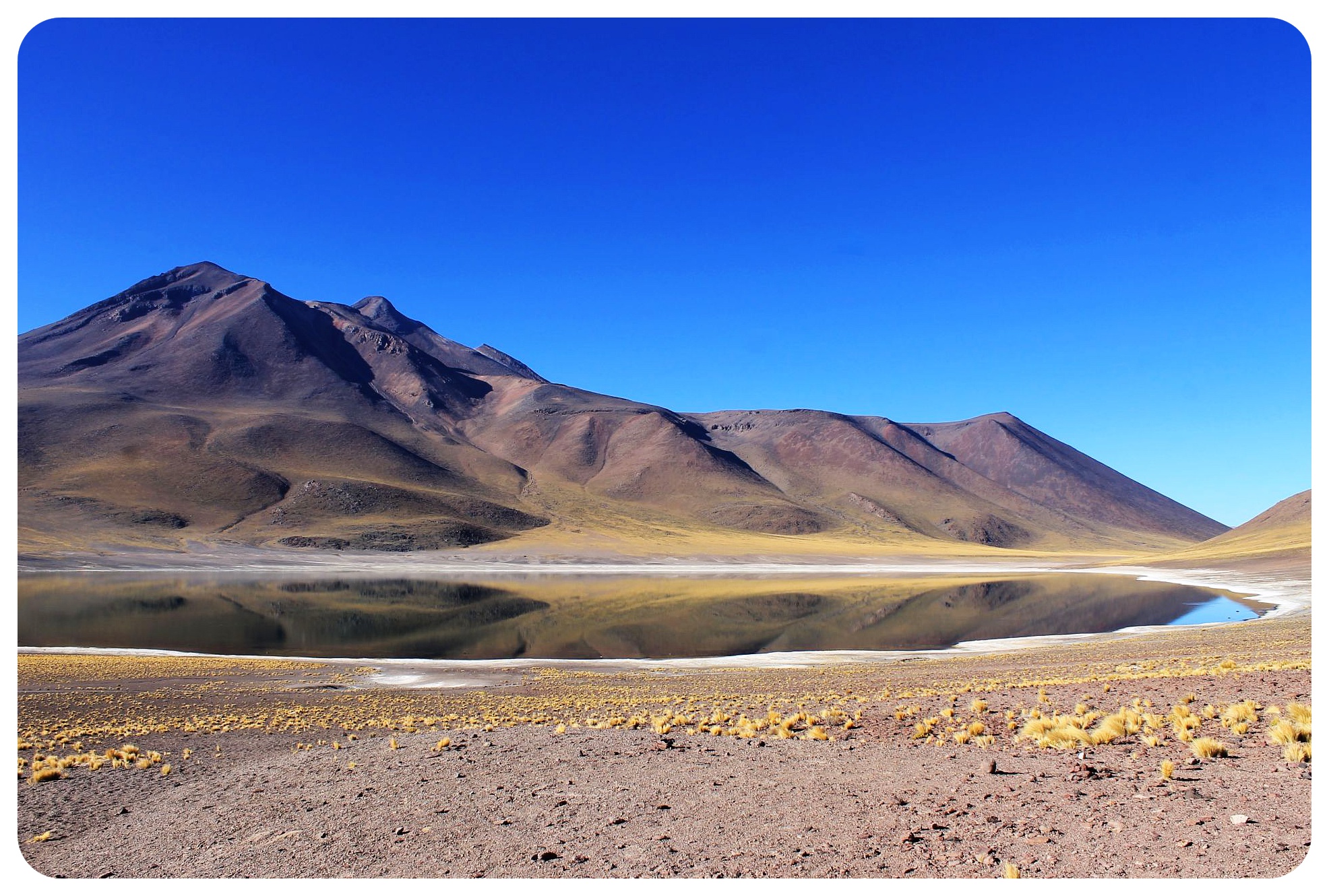


francesca salvati
Friday 21st of October 2016
Hi! Are there any specific tours you would recommend?
Dani
Sunday 13th of November 2016
Hi Francesca, yes, in this post here: What not to miss in the Atacama Desert. Hope you're enjoying Atacama just as much as we did :)
JavTime
Tuesday 25th of August 2015
Hello Dany, many thanks for your great insight into so many places. The last time I was in San Pedro was in 1992 and it was magical. You've reminded me of some great experiences. I'm originally from Santiago but love the north. Your blog is very positive and really make me want to travel soon. All the best for future travel experiences
Dani
Saturday 29th of August 2015
Thank you for the kind words! San Pedro is still magical but I bet it is very different than the place you experienced in '92! I hope you'll get to return one day :) And I hope I'll get to return one day :D
Stu
Thursday 28th of May 2015
I'm heading to San Pedro next month and these images have really inspired me. Such great scenery and colours. Thanks!
Dany
Saturday 30th of May 2015
So happy to hear this! I love that part of Chile so much. Enjoy the Atacama Desert, Stu :)
Youseef
Thursday 4th of December 2014
nice! pure beauty of nature, enjoying beauty of nature with your alive photos! and hoping to tour here! Thanks for sharing and making me happy!
Loving the Atacama desert with a tour • Where Is Your Toothbrush?
Tuesday 12th of August 2014
[…] to book a tour. In the end, we went for it because, after all, for us it would be an adventure and many other travelers have done it before us. It turned out better than […]